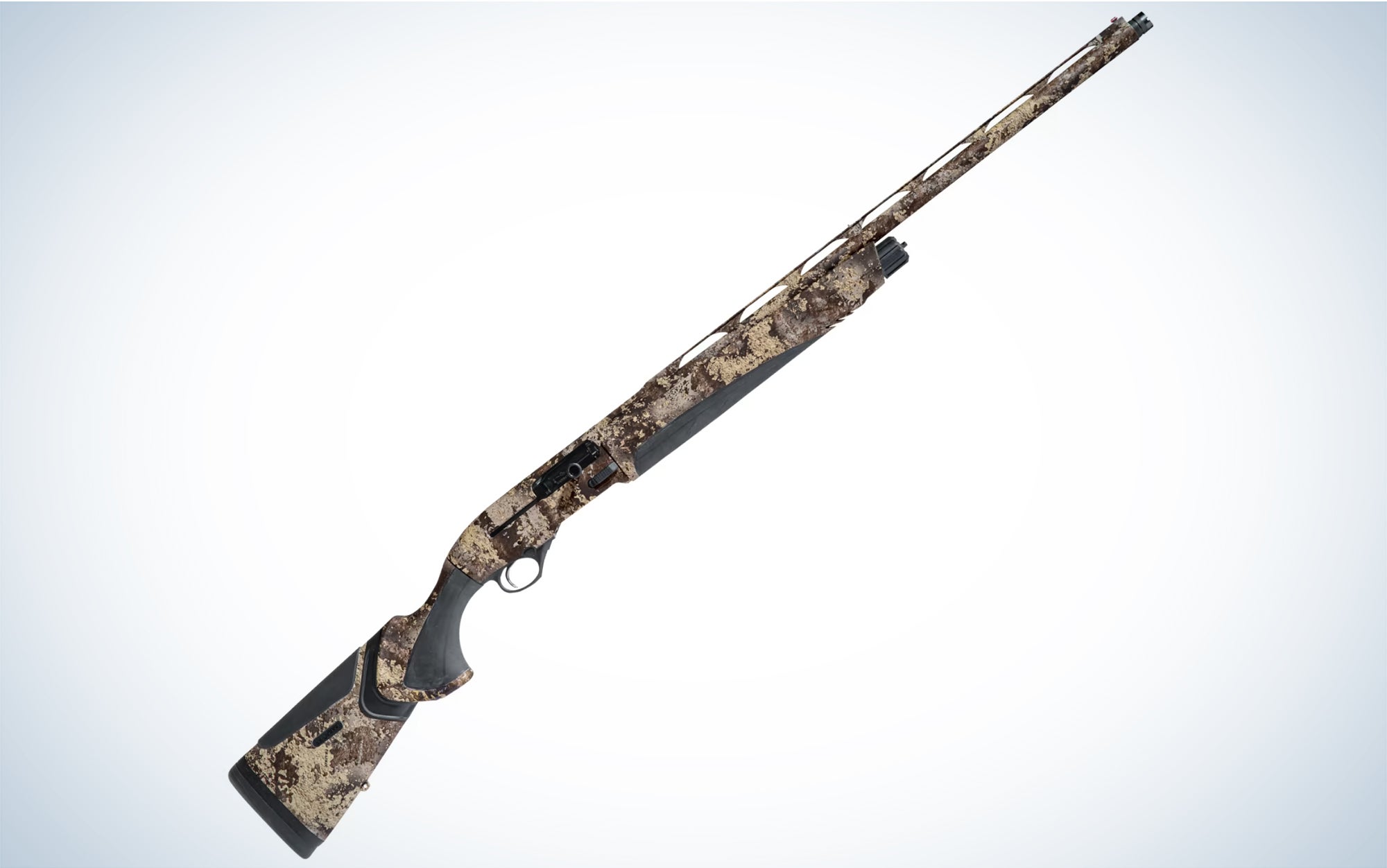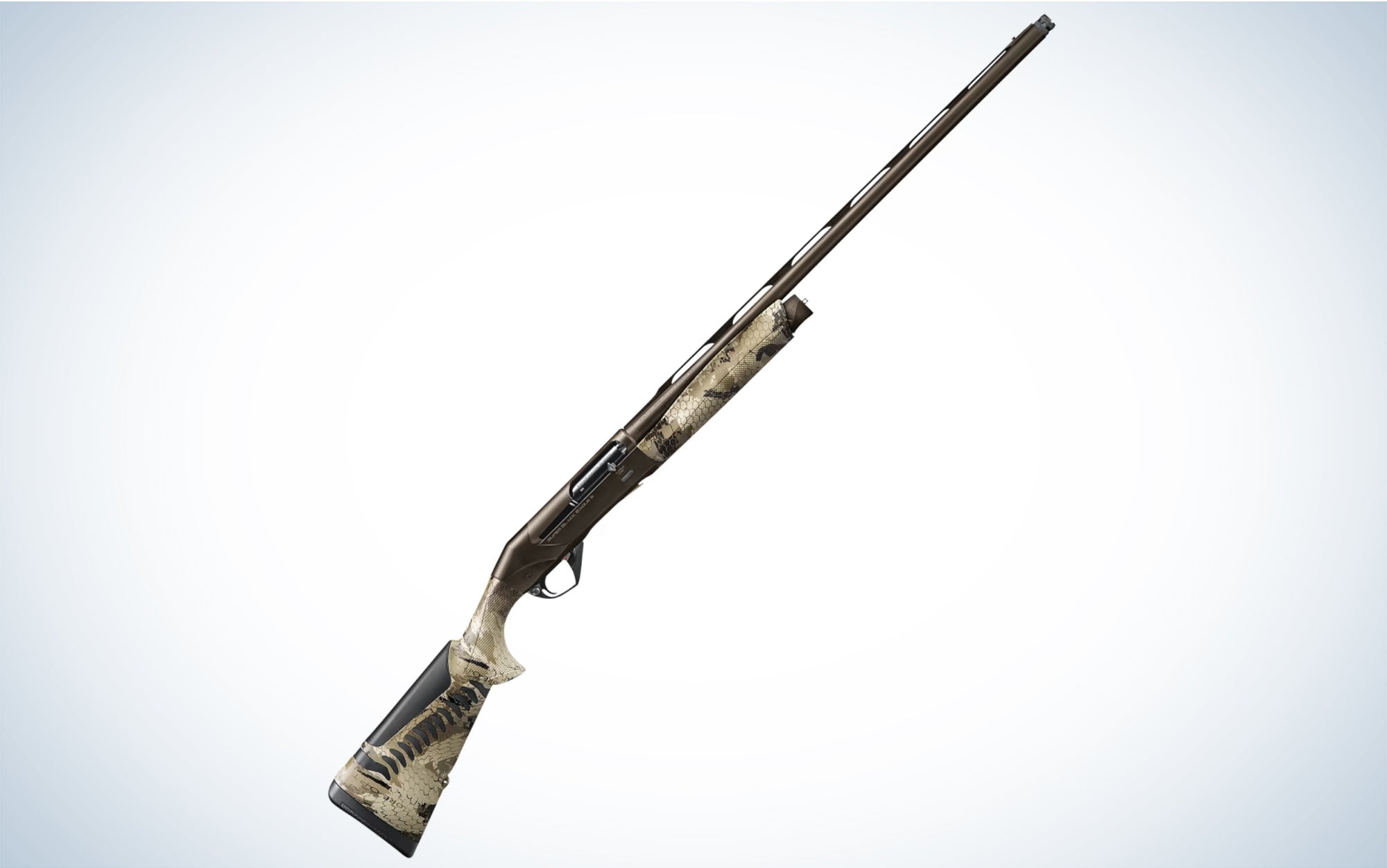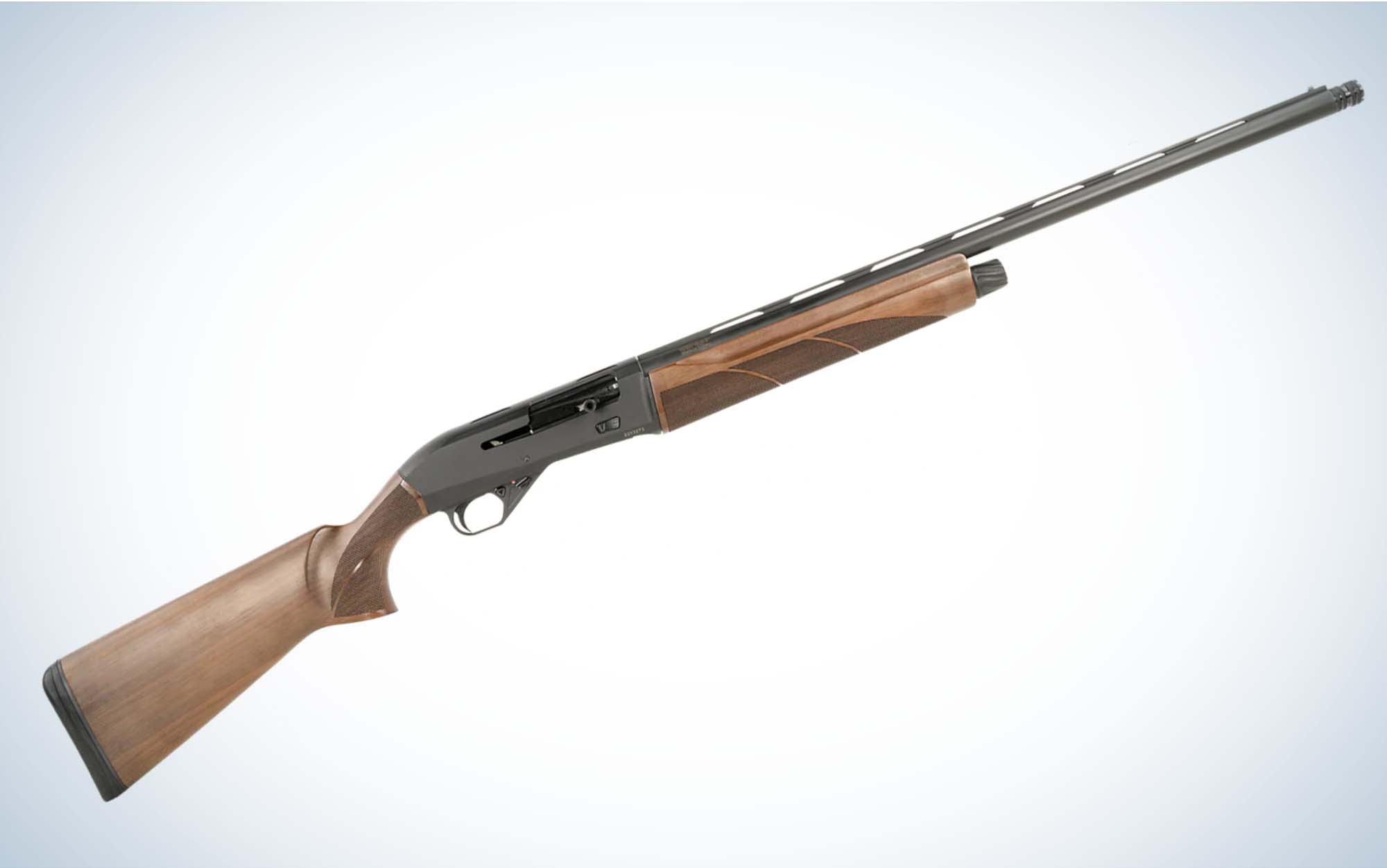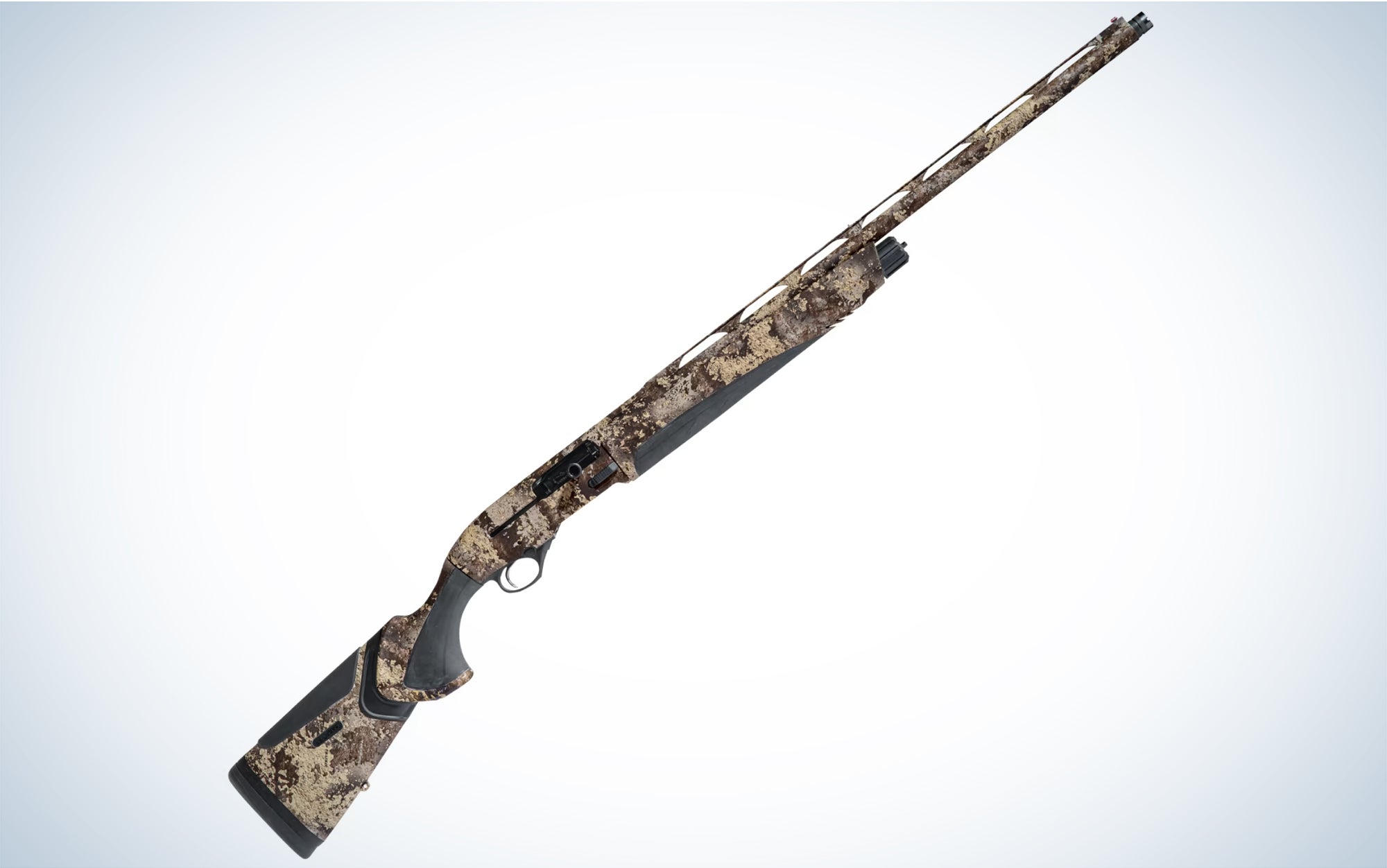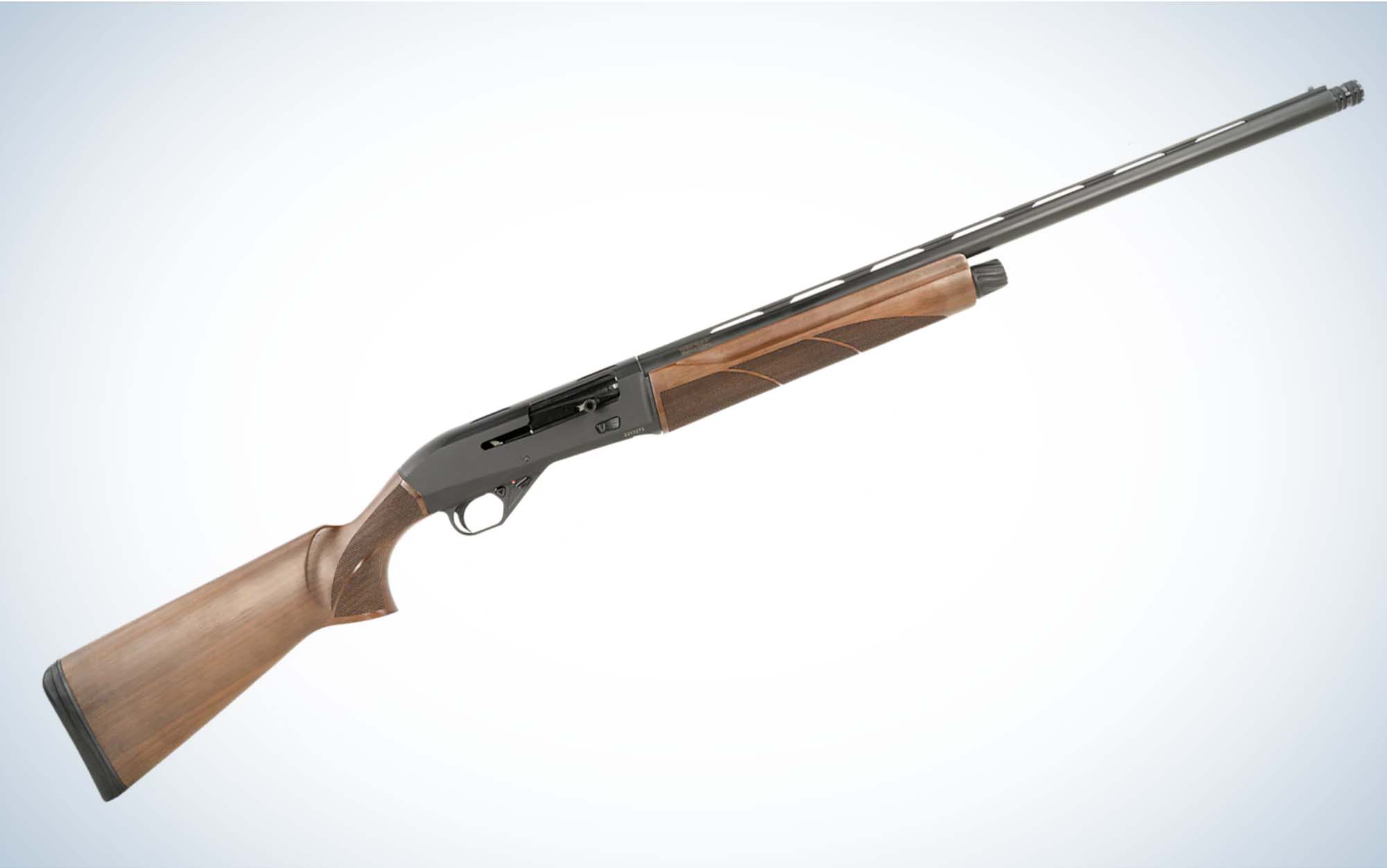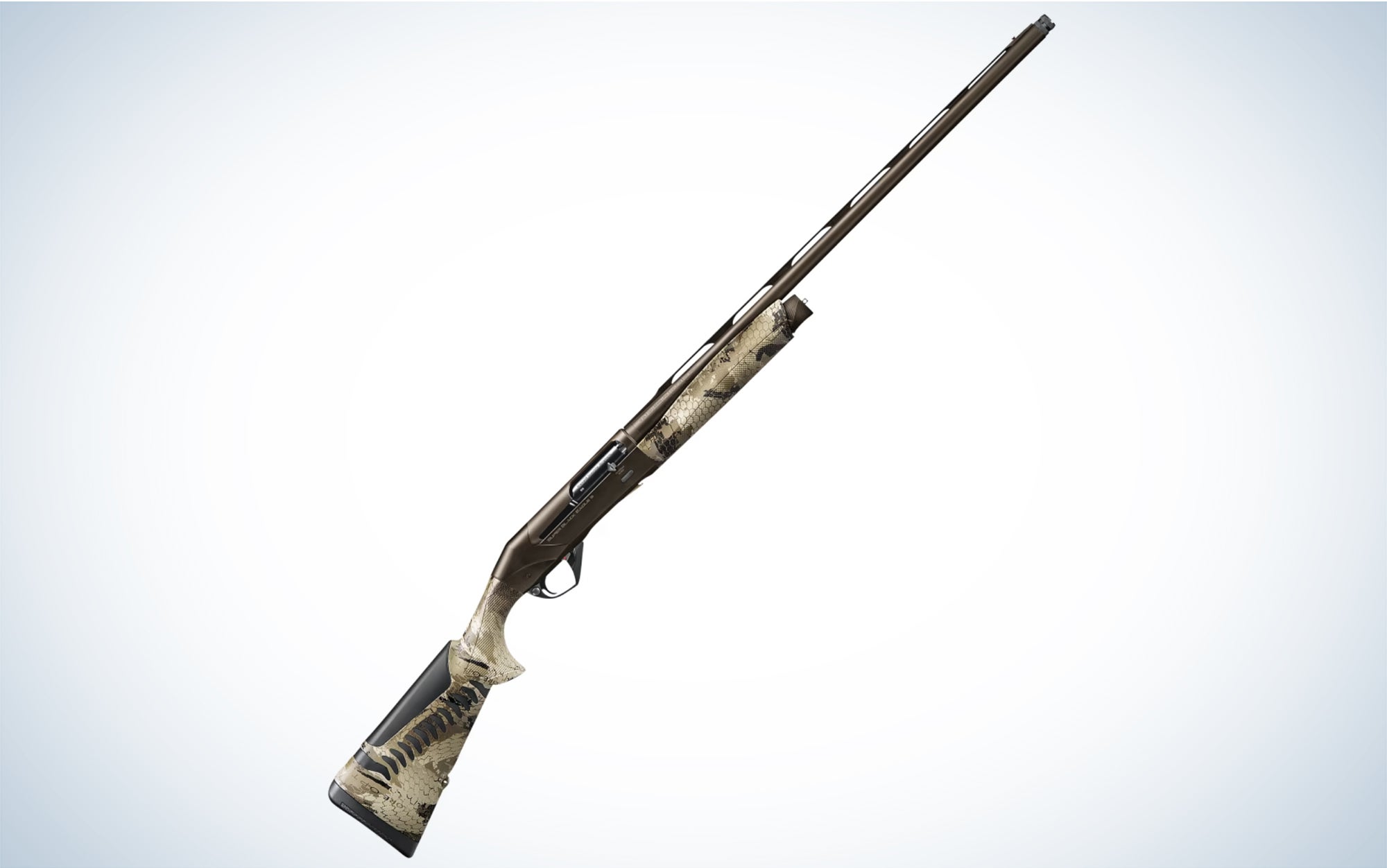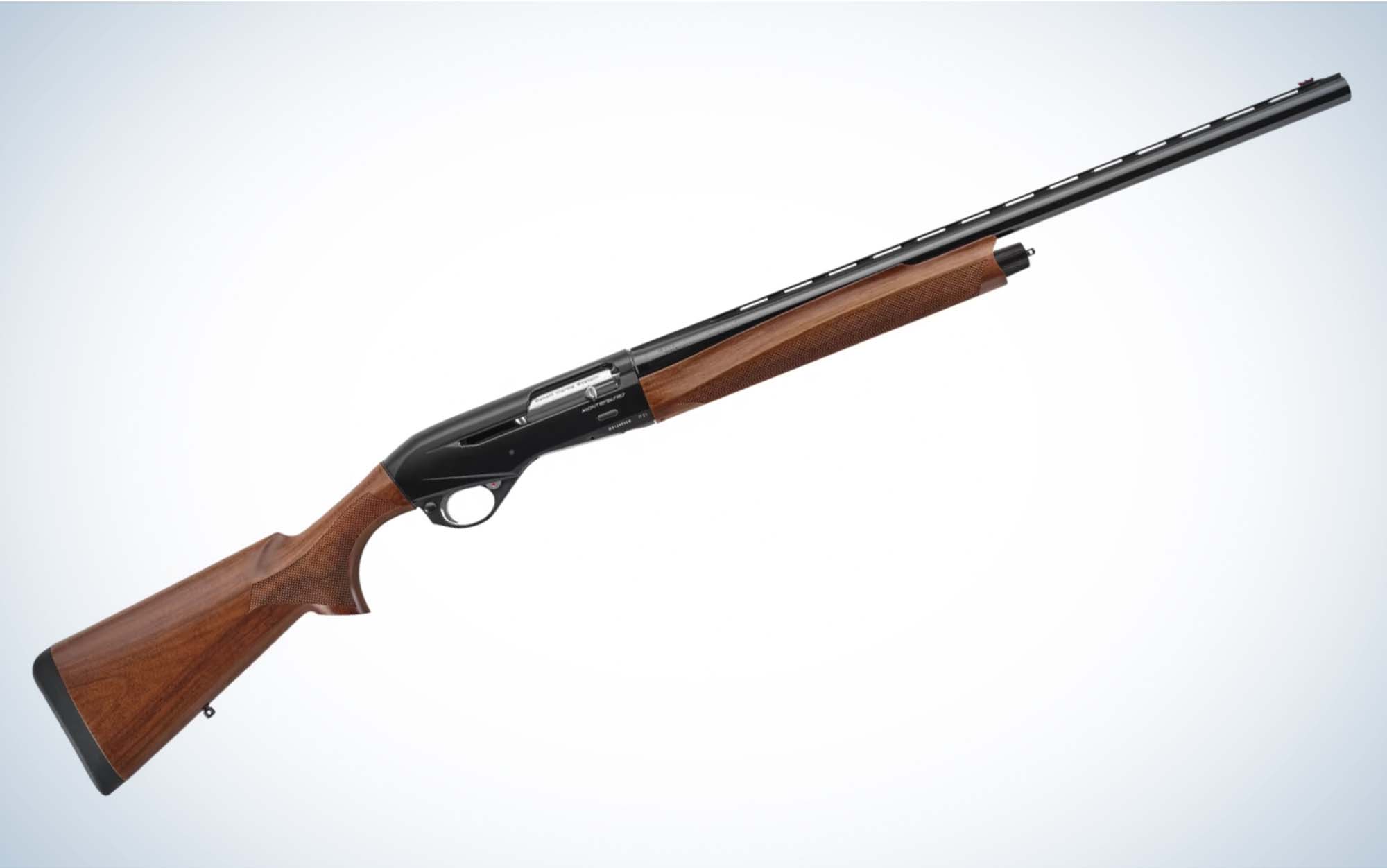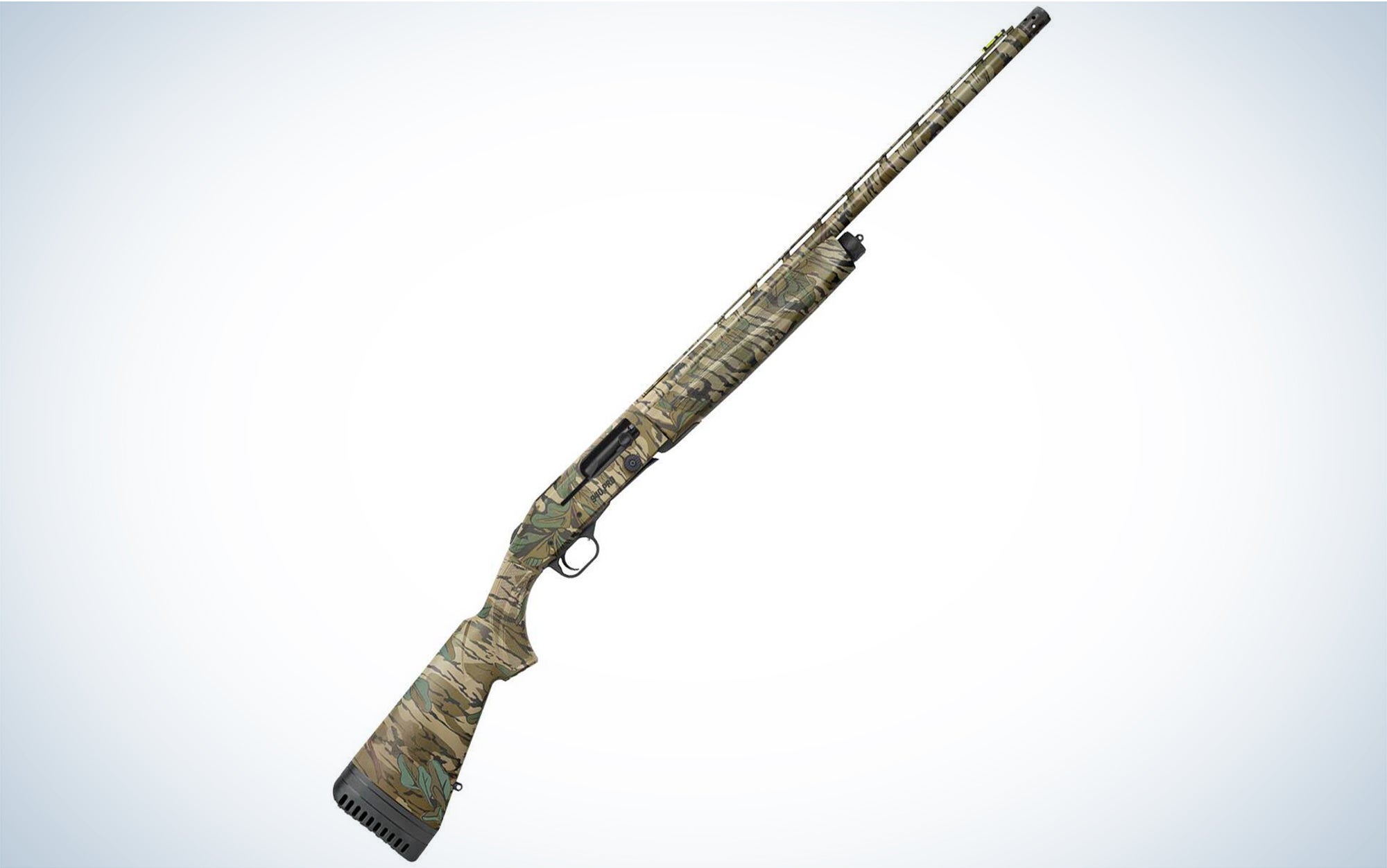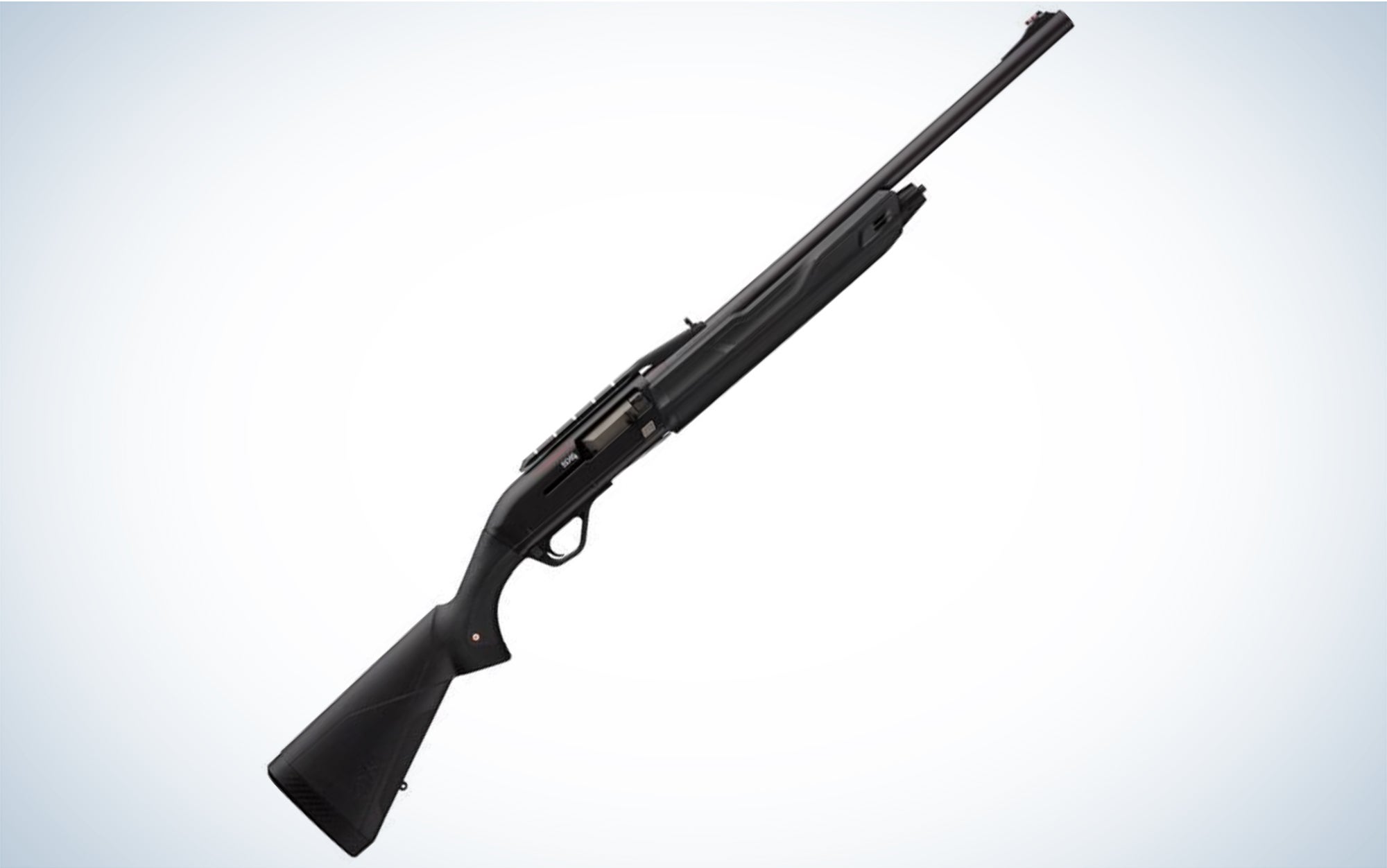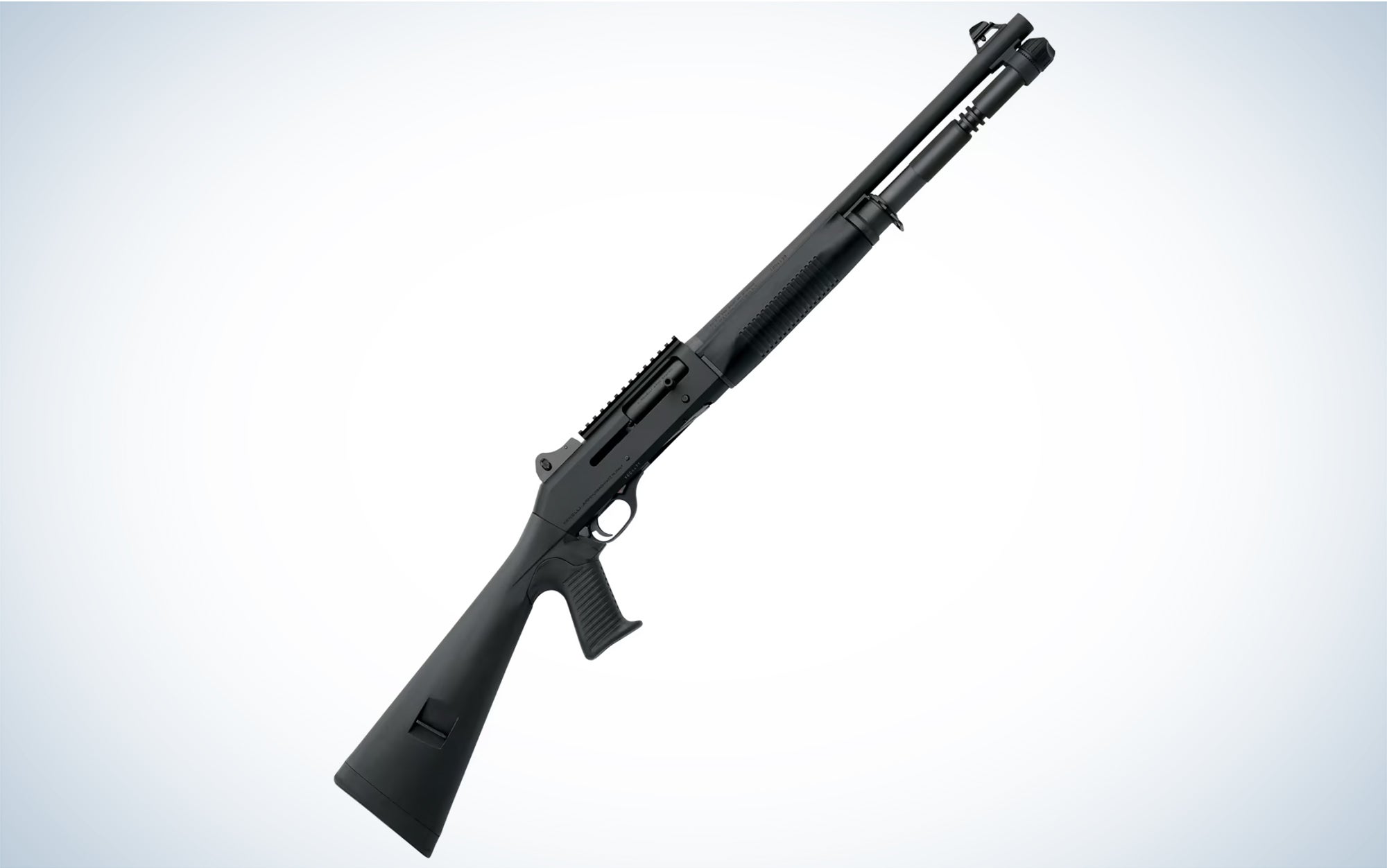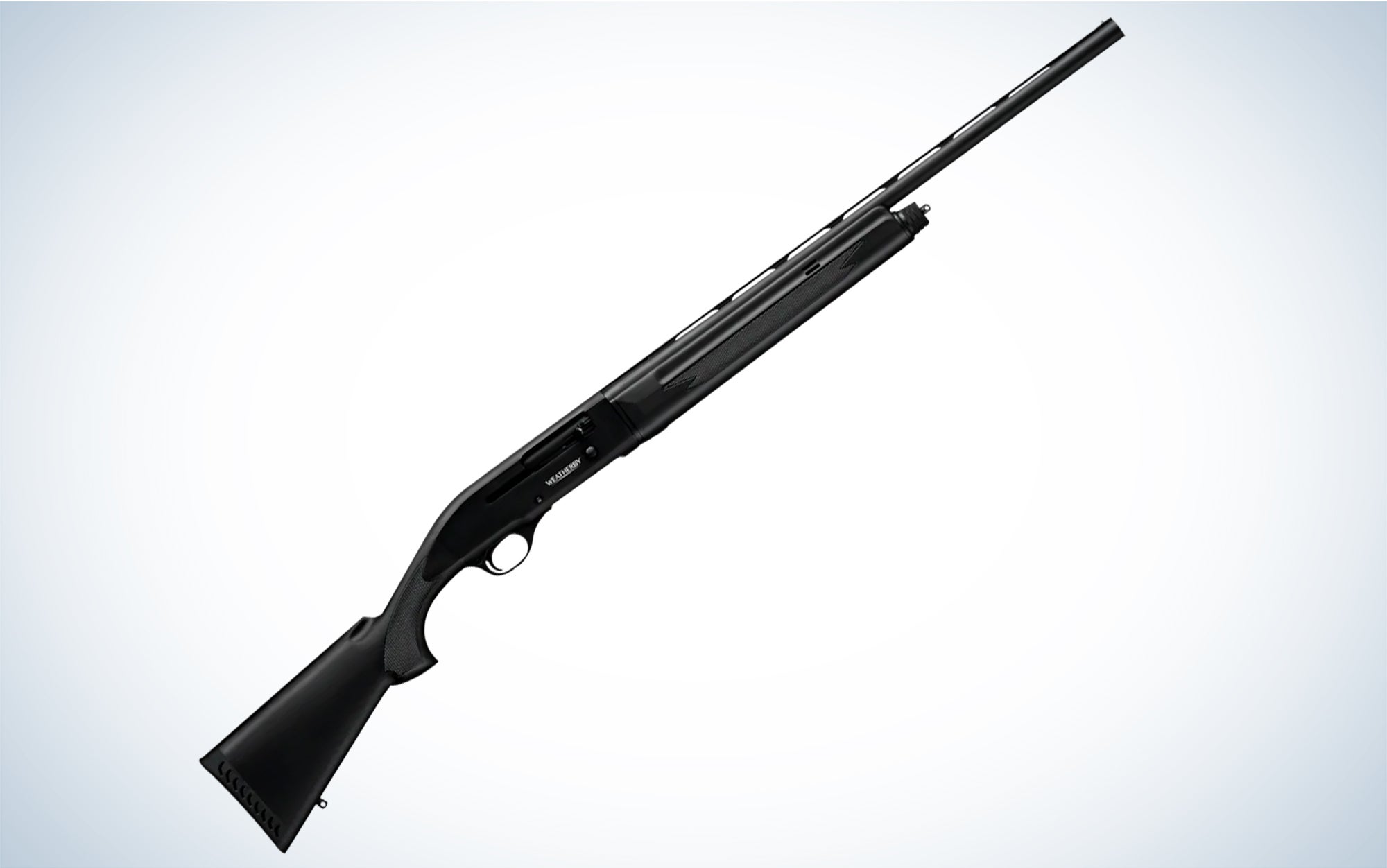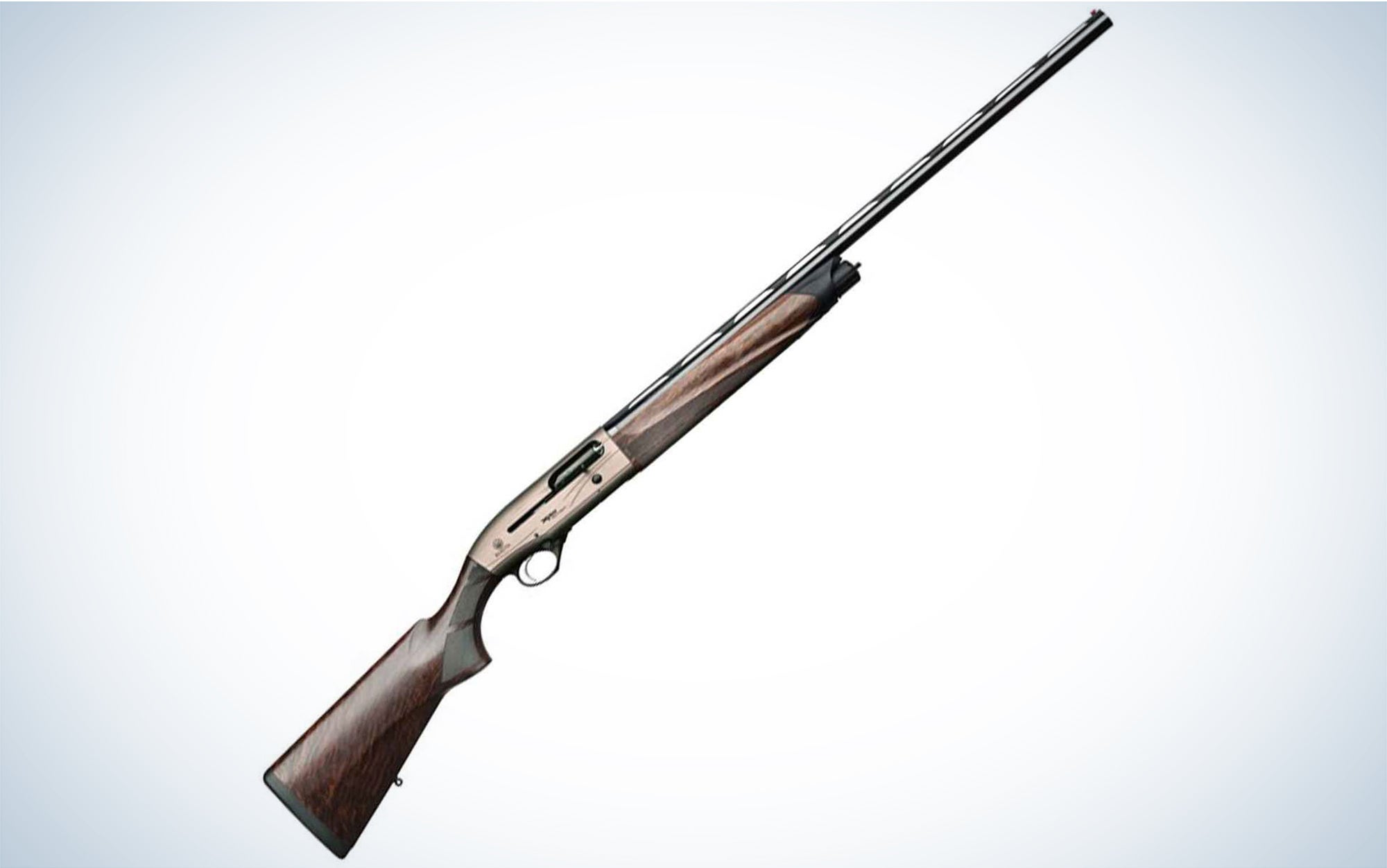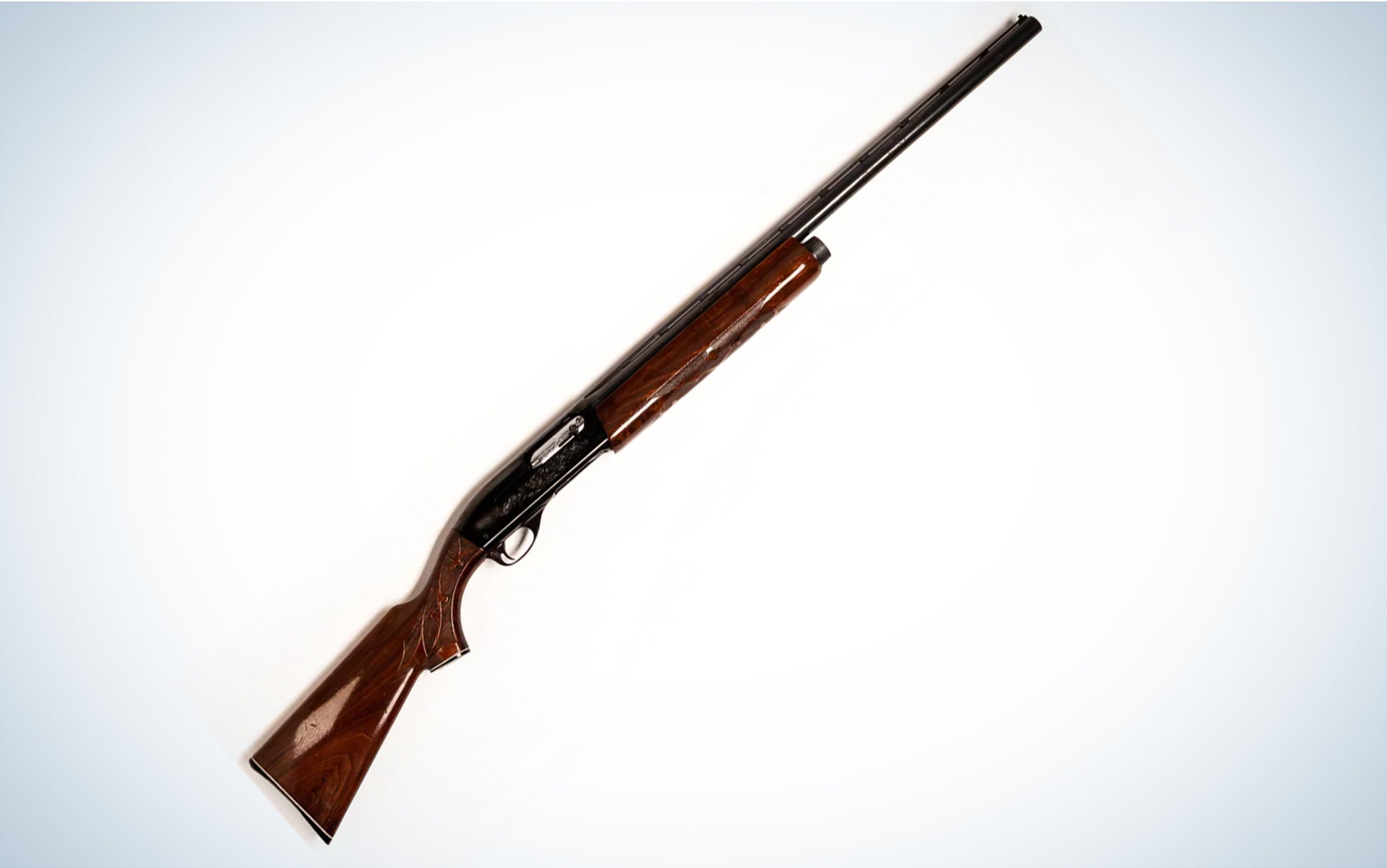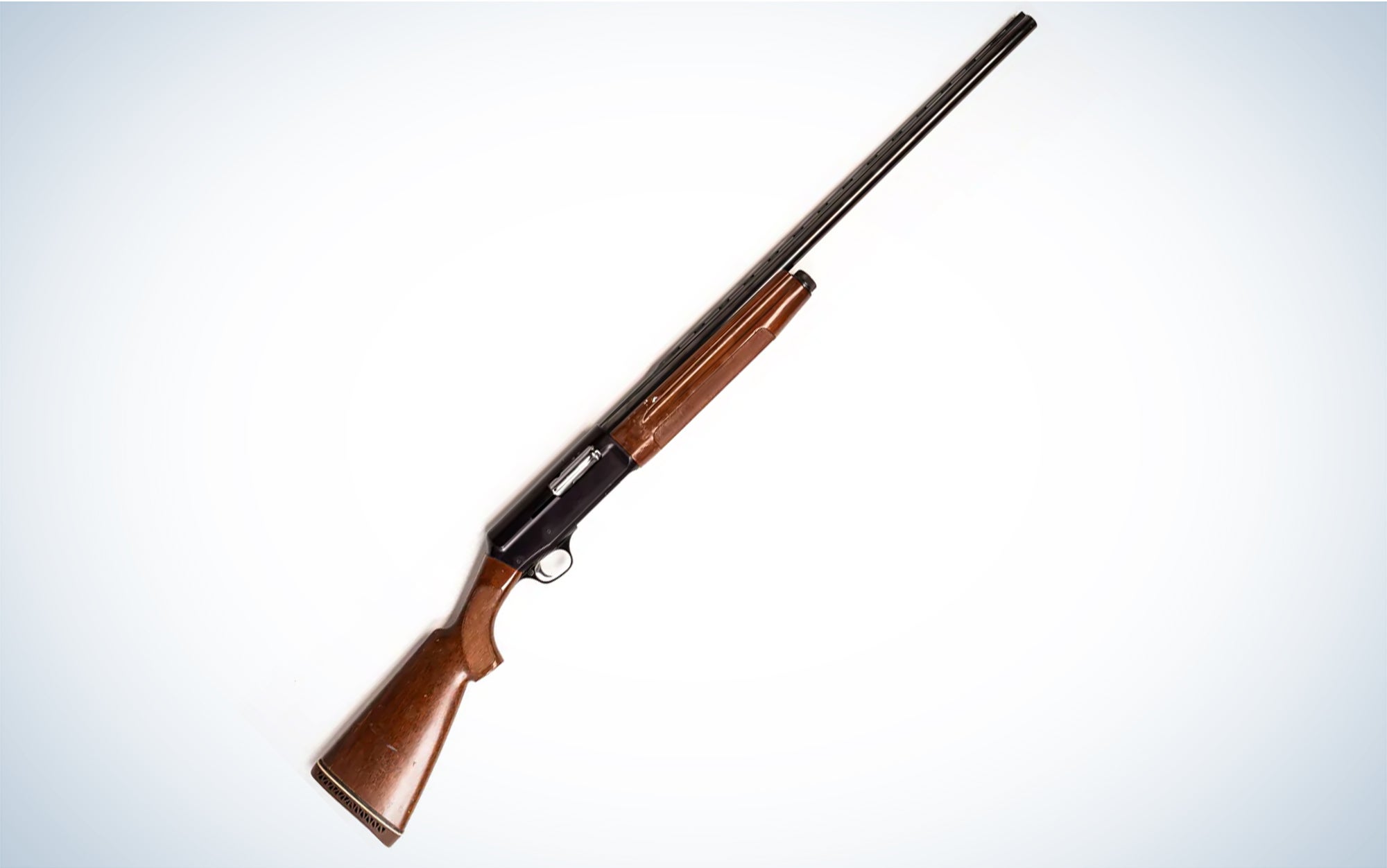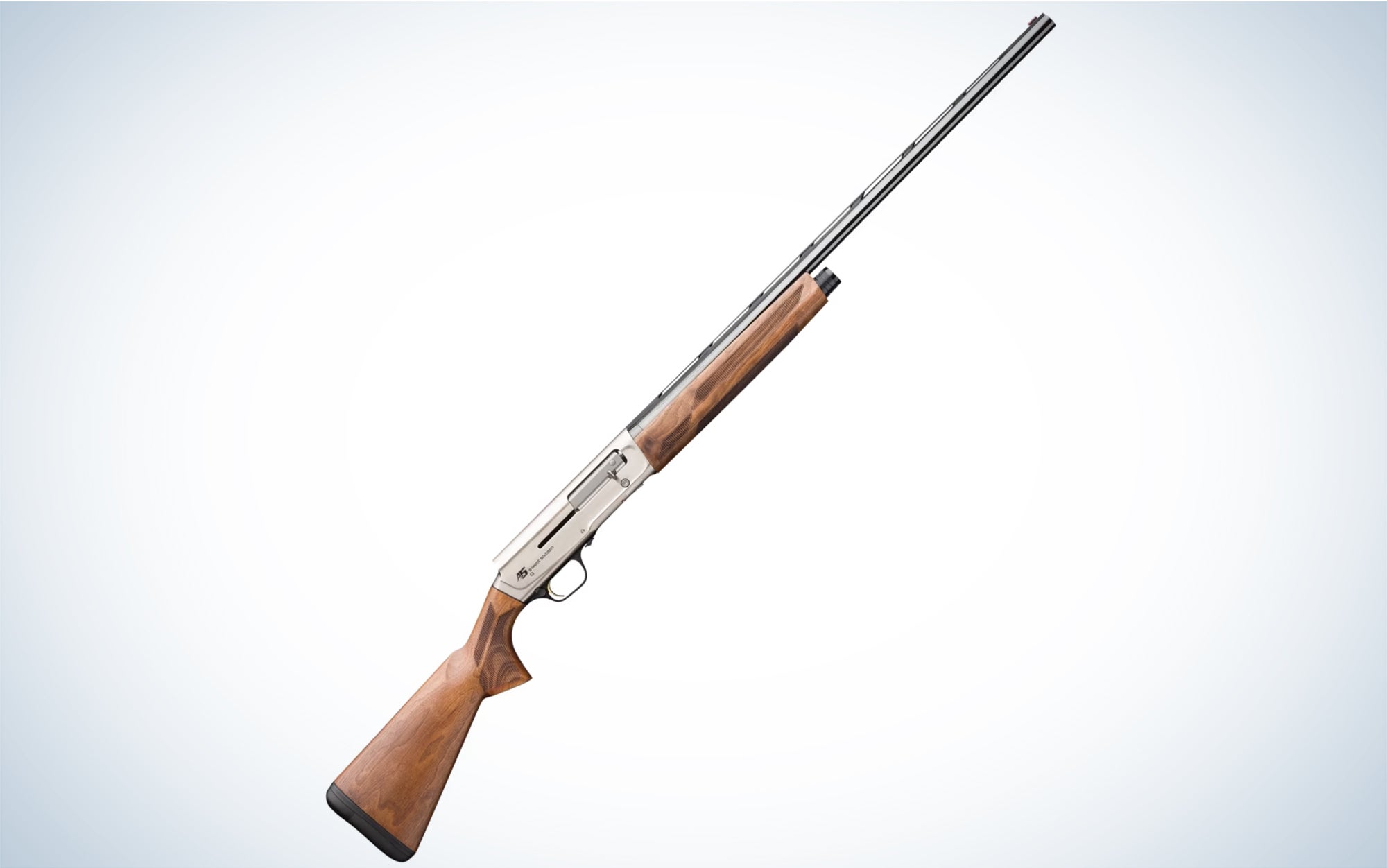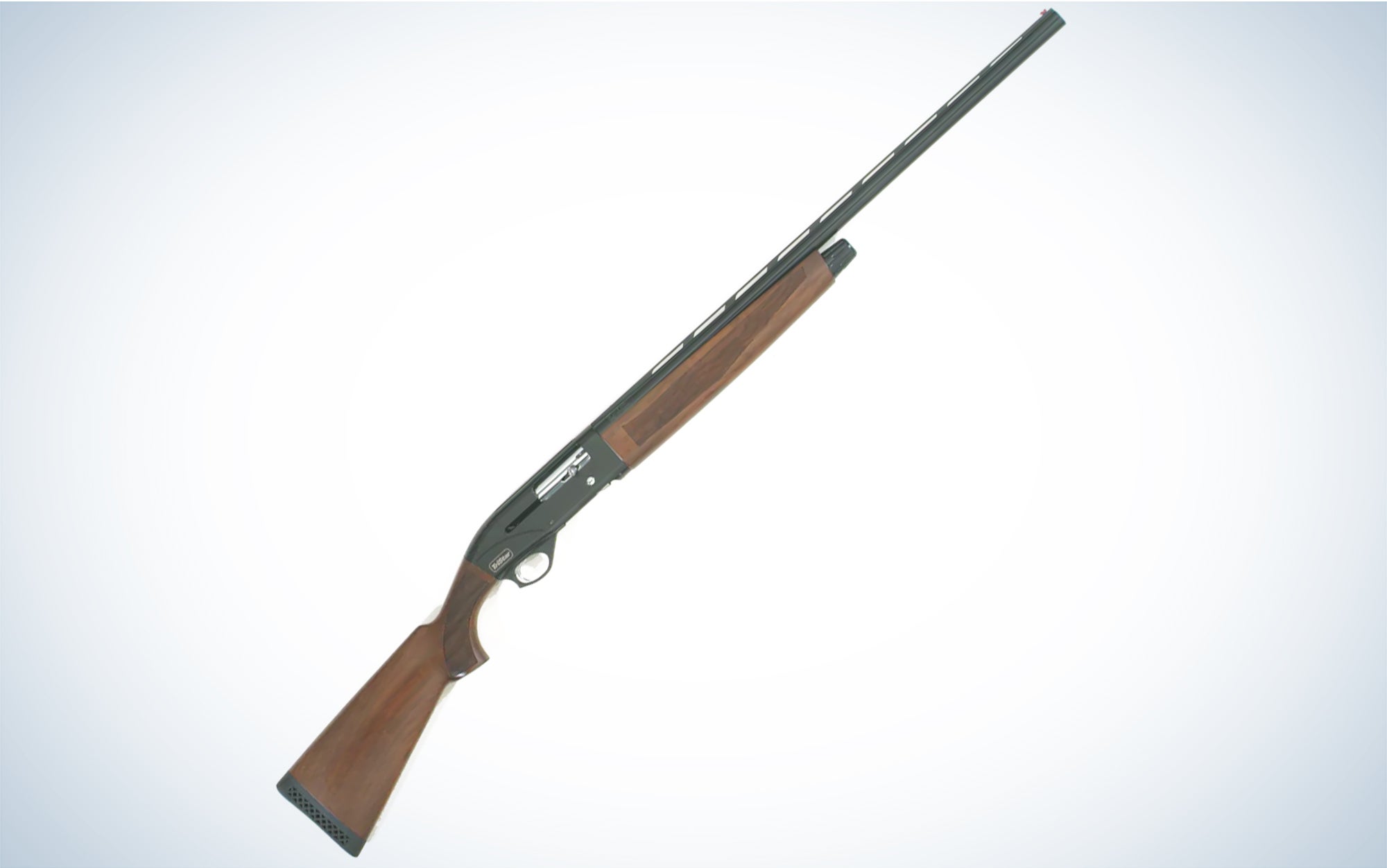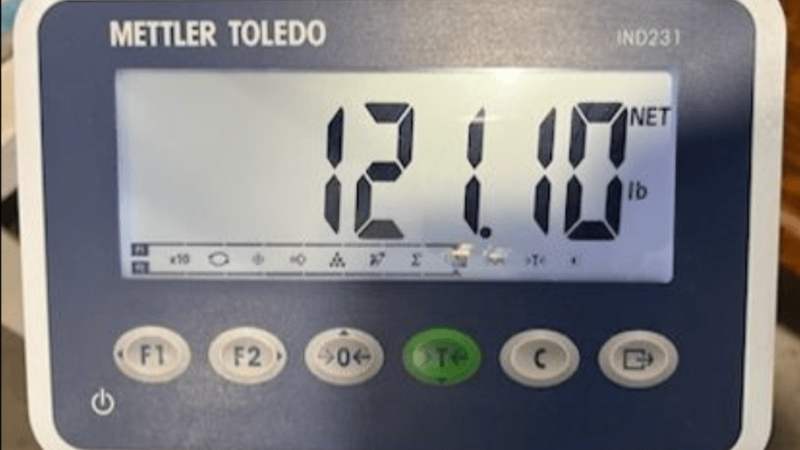The Best Semi Auto Shotguns of 2023
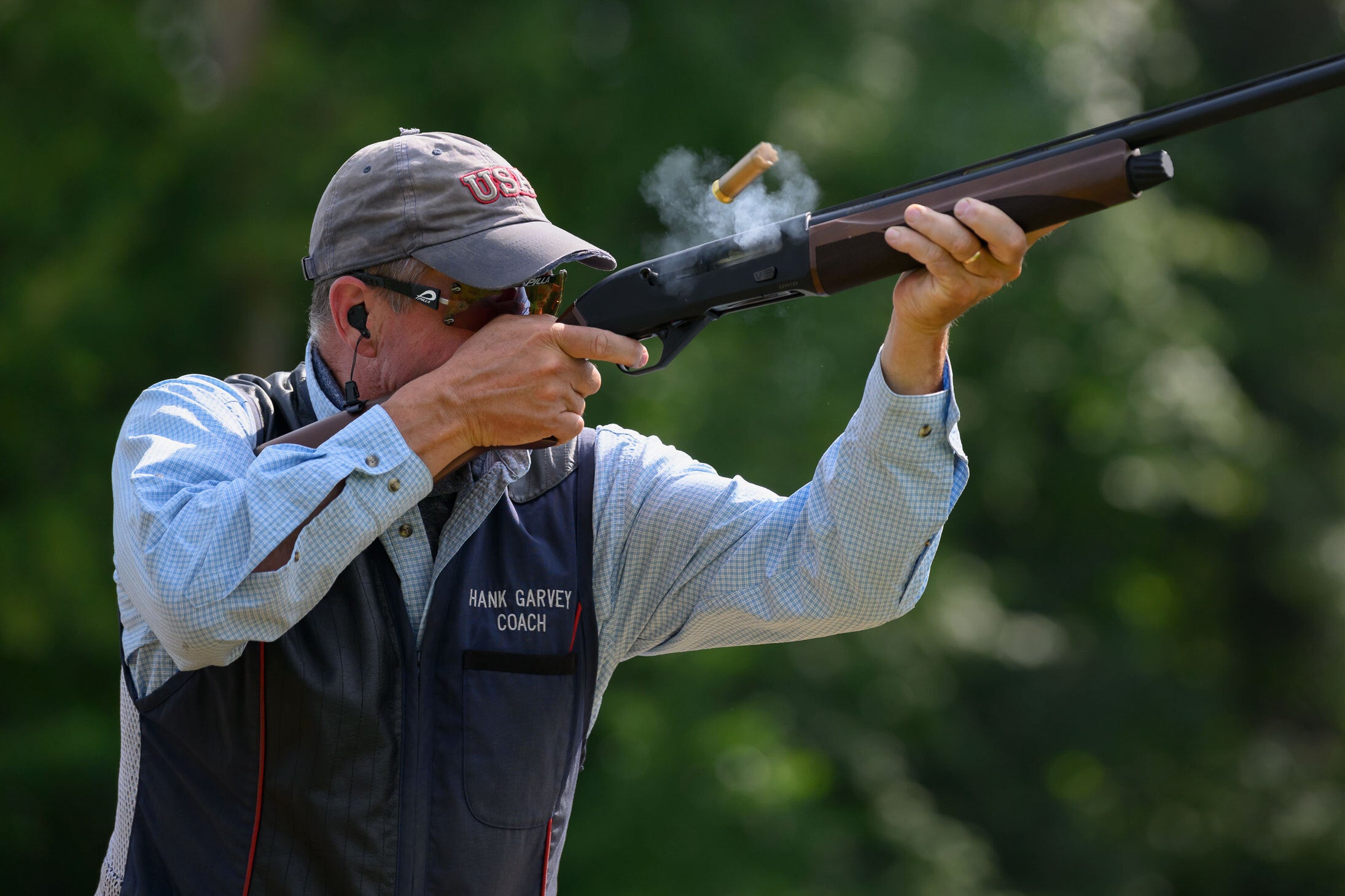
We may earn revenue from the products available on this page and participate in affiliate programs. Learn More ›
The best semi auto shotguns fire rounds reliably and cycle quickly. Even when built upon a relatively light platform, they soak up recoil and swing to birds and clays naturally. It’s no wonder that so many waterfowlers, upland bird hunters, and clays shooters opt for the modern semi auto shotgun.
But, you can’t talk about the best semi auto shotguns without first starting with John Moses Browning. When Browning debuted his long-recoil Automatic-5 in September 1903, it quickly became the world’s first successful production auto-loader. His design was nearly flawless, and as such, the Auto-5 enjoyed an almost century-long run until it was discontinued in 1999 (a new, redesigned version debuted in 2014). The semi auto survived two world wars, and was manufactured on three different continents—Europe, Asia, and the U.S. (as the Remington Model 11).
The popularity that the semi-auto platform enjoys today is largely thanks to Browning. Now manufacturers come out with a “new” auto-loader almost every year. With such an expansive selection, buying a new semi auto shotgun can get confusing. To help you decide which is the ideal fit for you, here are the best semi auto shotguns for hunting duck marshes, uplands, deer woods, and competing on the clays range.
- Best Overall: Beretta A400 Xtreme Plus
- Best Value: CZ 712 G3
- Best for Waterfowl: Benelli Super Black Eagle 3
- Best for Upland Hunting: Benelli Montefeltro
- Best for Turkey: Mossberg 940 Pro Turkey
- Best for Deer: Winchester SX4 Cantilever Buck
- Best for Home Defense: Benelli M4 Tactical
- Best for Small Game: Weatherby SA-08 Deluxe
- Best Sub-Gauge: Beretta A400 Xplor Action 20-Gauge
- Best for Clays: Remington 1100
- Best Youth: Franchi 48 AL
- TriStar Viper G2 Wood Walnut
- Browning A5 Sweet Sixteen Upland
How We Picked the Best Semi Auto Shotguns
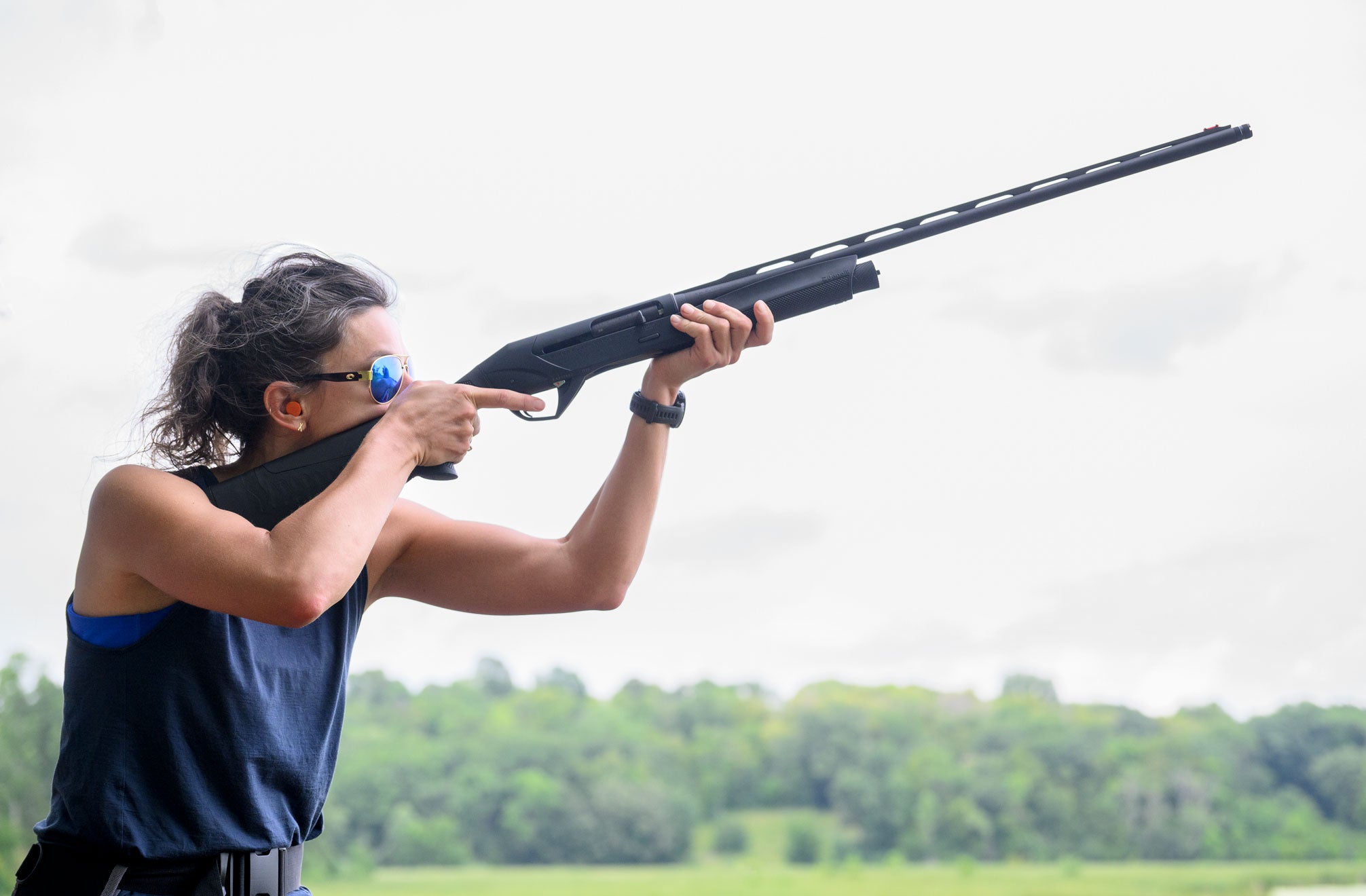
I have shot semi auto shotguns from every manufacturer that currently builds or imports shotguns to the U.S. I’ve hunted with them in duck blinds and pheasant fields and shot them extensively at the range. For this review, I weighed cost, functionality, fit, and availability in picking the best semi autos.
Best Semi Auto Shotguns: Reviews and Recommendations
Best Overall: Beretta A400 Xtreme Plus
Beretta
Why It Made the Cut
You can use the A400 Xtreme Plus for any hunting pursuit that requires a shotgun. It is also one of the softest shooting semi autos ever designed.
Key Features
- Gas-driven
- 3½-inch chamber
- Three-spring hydraulic Kick-off Mega recoil system
- Available in 20- and 12-gauge
Pros
- Ultra-reliable Blink operating system
- Very little felt recoil
- Gun fit is optimal for many shooters
Cons
- It’s 7.8 pounds, so it carries on the heavy side
Beretta’s A400 Xtreme Plus was the Editor’s Choice in Outdoor Life’s 2021 best duck hunting shotgun test, but it can be used for multiple hunting and shooting pursuits, including deer, turkey, upland, clay shooting, and of course, waterfowl. This shotgun outperforms all others because of the gas-driven platform it is built on and the attention to detail its Italian engineers paid to the design of the A400. The Kick-off Mega recoil system has three hydraulic springs located in the stock to dampen recoil, which it does extremely well. Even heavy 2-ounce turkey loads are manageable for most hunters shooting the Beretta. The Blink system runs the action by regulating the amount of gas that is used to work the bolt when the gun is fired. Beretta touts Blink for its speed, and while it is fast, there is also less time for recoil to disperse, though the combination of Kick-Off, the gas-operation, and the weight of the gun (7.8 pounds) negates the recoil.
The 12-gauge is drilled and tapped for an optic, plus it comes in three barrel lengths—26-, 28-, or 30-inch. It has a 5.1-pound trigger pull, which is on the heavy side, but I have never noticed it much when ducks are in the decoys. The heavier trigger could be a slight issue when you need to aim the A400 at turkeys or deer, but the gun weighs almost 8 pounds, so that will help keep it steady when you touch off a round of TSS or a slug. Breaking down the A400 is a snap due to the quarter-twist fore-end cap. Just push down on the cap, turn, and it comes right off. Beretta offers the A400 in Realtree, Mossy Oak, and True Timber camouflage finishes as well as a synthetic option. There is also a left-hand variant available.
Best Value: CZ 712 G3
CZ
Why it Made the Cut
This is a functional and capable semi-automatic shotgun that has a real-world price of about $550.
Key Features
- Gas operated
- 3-inch chamber
- Walnut stock
- Includes five extended chokes
- Two interchangeable pistons (one for target loads, one for game loads)
Pros
- Very affordable
- Capable in the field
- Decent aesthetics for the price point
Cons
- Patterned to the right
- Shooter must remember to swap pistons based on power of load
There aren’t many shotguns (even pump shotguns) at the $550 price point that we would recommend. Even if you consider your shotgun to be a tool and nothing more, you’re likely going to have that tool for many years, and perhaps a lifetime. If the gun doesn’t run reliably, that’s many years of misery. Especially when it comes to semi-auto shotguns, it’s usually smart to invest a little more money on the front end for a mid-priced shotgun in the $800 to $1,000 range.
So it was with a skeptical eye that we looked upon the CZ 712 G3 during our test of the best shotguns in 2023. This is a Turkish-made gas gun with a design that requires the shooter to swap pistons when switching from light target loads to heavier game loads. Cause for skepticism abounded.
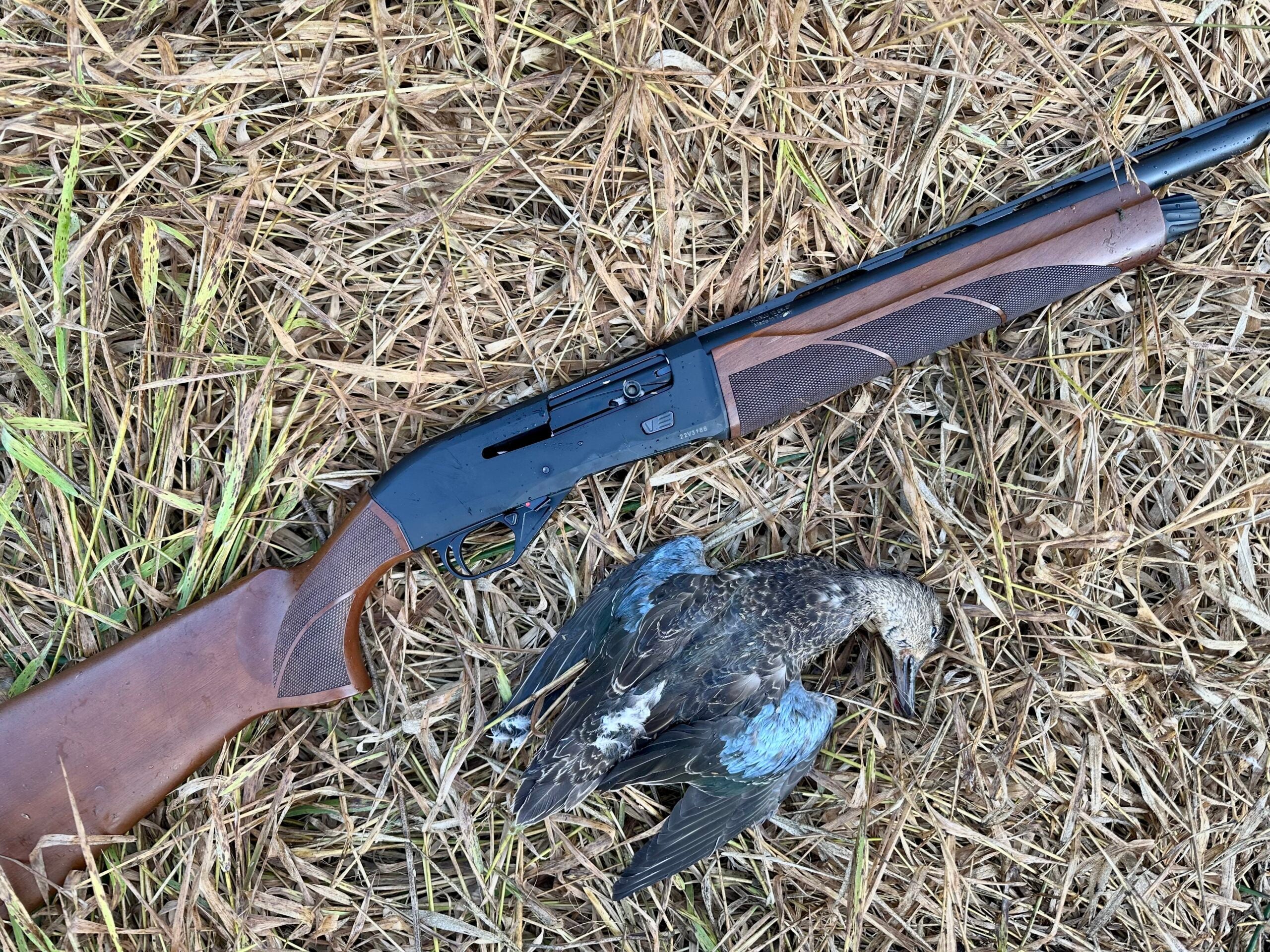
But we began to warm to the shotgun as we started breaking clays with it. The action is snappy and stiff (though not in a bad way). It certainly wasn’t the smoothest handling shotgun in our test but it wasn’t a total clunker either. After our initial testing I also took the shotgun teal hunting and it felt right at home in the marsh.
Most importantly, the gun ran. We had only a few minor cycling issues with light target loads when the CZ got dirty. But that problem was easily solved with a quick wipe down and some lube. I did notice that the CZ’s gas system gets dirty rather quickly. If you chose it as your go-to do-it-all shotgun you’ll want to strip and clean it regularly.
The only real downside is that we found it patterned to the right. On the patterning board it impacted about 8 inches off center (a full pattern more or less) at 13 yards with a variety of different target loads. That might have been an issue with our individual sample, but in any case, it shouldn’t be a deal breaker since the shotgun comes with a shim kit to help you get it on target. —AR
Best for Waterfowl: Benelli Super Black Eagle 3
Benelli
Why It Made the Cut
The SBE platform is the most popular shotgun among duck hunters because it’s reliable, durable, and low maintenance.
Key Features
- Inertia-driven
- 3- and 3½-inch chamber variants
- Available in 28-, 20-, and 12-gauge
- Comfortech recoil system
Pros
- Inertia-operated, so it runs cleaner than gas guns
- Incredibly reliable in cold weather
- Multiple gauge options
Cons
- Typically shoots 80 to 100 percent above center of target
Product Description
Benelli’s Super Black Eagle 3 is one of the most recognizable shotguns in duck blinds across the four flyways because hunters have found the SBE to be so reliable. The inertia operating system is much simpler than the systems of gas guns. And since the gun blows most of the gasses created by the shotshell propellant out the end of the muzzle, you don’t have to field strip a Benelli as often, though you should keep it clean so that it’s in good working order. The rotating bolt head has a detent that ensures the shotshell is sent into battery no matter how softly you slide the bolt forward. Previous SBEs and other Benellis did not have this feature and the shell sometimes remained (unknowingly) out of battery—a major inconvenience when you’re ready to fire the gun.
SBE3s produce more recoil than most gas guns, but it’s made manageable by the Comfortech system, which is a series of synthetic chevrons located inside the stock. When the trigger is pulled, the chevrons flex, so that the shooter experiences less recoil. Some Benellis tend to shoot high—100 percent above center of target—on the pattern board, but I have never found that to be an issue when making kill shots on ducks. The SBE 3 includes a shim kit which shooters can use to easily lower their point of impact if needed. Available in 3- and 3½-inch chambers, and three different gauges—28, 20, and 12—the SBE is outfitted with a 26- or 28-inch barrel (there is a 24-inch barrel on the turkey model). Finish options include: black synthetic, walnut, Gore-Optifade, Realtree, and Moss Oak.
Best for Upland Hunting: Benelli Montefeltro
Benelli
Why it Made the Cut
This light 12 gauge carries easily, mounts quickly, and swings wonderfully
Key features
- 6.63 pounds (12 gauge, 26-inch barrel)
- Available in 12 and 20 gauge
- 3-inch chamber
- Inertia driven
- Included shim kit
- 3 chokes (IC, M, F)
- Satin walnut stock
Pros
- Light and handy
- Comes to the shoulder quickly and naturally
Cons
- Finish will get dinged up with hard use in inclement weather
Benelli updated its Montefeltro line in 2023 with an improved bolt system (no more “Benelli Click”) and slimmer ergonomics. Our team loved the way the gun handled and swung through targets during our 2023 shotgun test. In fact, the Montefeltro earned the highest value score for top-end shotguns.
It’s an ideal semi-auto for upland bird hunting. At 6.63 pounds it’s plenty light for carrying through the fields all day. Despite its light weight and its inertia driven system, the shotgun mitigates recoil fairly well. We attributed this to stock good geometry and its cushy recoil pad. So if you want to shoot heavy 3-inch loads at late-season roosters, the Montefeltro won’t punish you too badly. During our testing it threw a 70/30 pattern, which is about perfect for flushing-away birds.
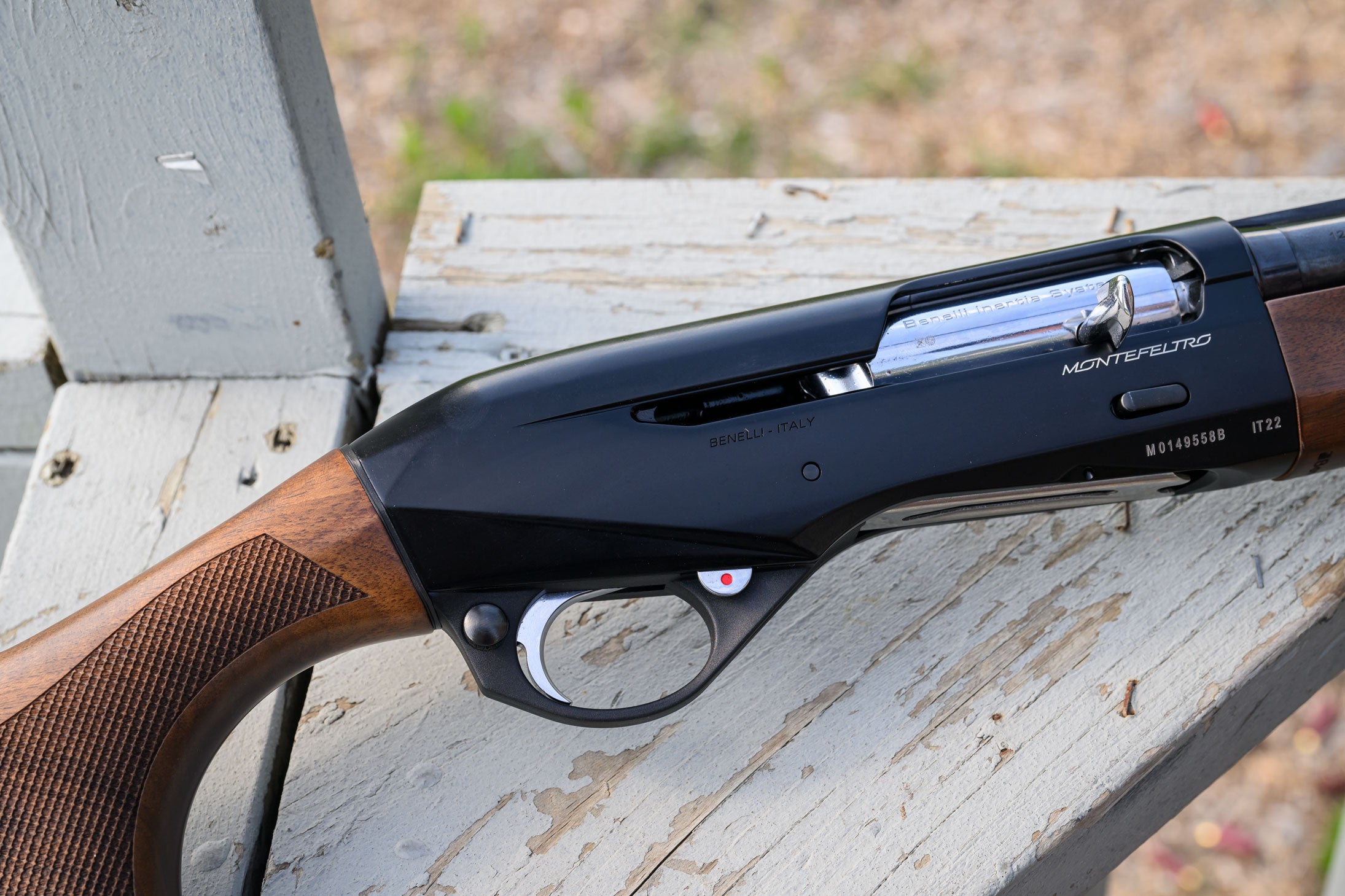
Plus, it looks nice, which is important for an upland bird gun. As Shooting Editor John B. Snow wrote in his review: “The finish on the barrel and receiver is rich and attractive, and the chrome bolt completes the gun’s pleasing aesthetic.”
Just remember that while that gloss-blue finish might look sexy out of the box, you’ll have to keep it oiled to prevent rusting after a day of hunting in the wet and snow. And don’t get discouraged when you start to see knicks and dings in the satin walnut stock, those add character to a hardworking bird gun.—AR
Best for Turkey: Mossberg 940 Pro Turkey
Mossberg
Why It Made the Cut
There are more turkey shotguns on the market now than ever, mainly due to the fact that Mossberg set the trend by building specialized repeaters, like the 940 Pro, at a reasonable price.
Key Features
- Gas-operated
- 3-inch chamber
- 18.5- and 24-inch barrel options
- RMSc micro-dot sight-ready
Pros
- Gas system reduces felt recoil
- Nitride coating inside action for added reliability
- Cut for low-profile RMSc red-dot optic
- XX Full Choke included
Cons
- Fit and finish are a little rough around the edges
Red dot sights are popular on turkey guns these days and Mossberg has leaned into that trend by making two cuts in the top of the receiver where a low-profile RSMc red dot (sold separately) can be added. This means that you can mount an optic low on the receiver and maintain a good cheek weld on the stock.
The clean-running gas system is another component that makes the 940 such an attractive choice for turkey hunters. There’s a gold buffer tube that slides over the magazine to cut down on carbon buildup, so you don’t have to strip and clean it as often. Gas guns typically tame recoil more than inertia-driven semi autos, and that is certainly the case with the Mossberg. It’s also a 7½ pound gun, not overly heavy to carry in the turkey woods, but enough weight to soak up recoil (in conjunction with the operating system).
Mossberg designed the 3-inch gun, which costs under $1,000, with an oversized bolt handle and load port to make the semi auto shotgun easier to manipulate in the dark or when you run and gun and need to load and unload ammo for safety. It also comes with an XX-Full .670 choke and Hiviz red, green, and white front sights. The length of pull is adjustable from 13 to 14¼ inches, and the 940 is finished in Mossy Oak Greenleaf camouflage. During pattern work with Federal Heavyweight TSS 1¾-ounce No. 9s, the 940 averaged 161 pellets inside a 10-inch circle at 40 yards and 68 pellets at 60 yards (10-shot average for both yardages).
Beyond pattern testing, Outdoor Life editors killed three turkeys in two states with the Mossberg 940 Pro Turkey last spring. It proved to be a handy shotgun in heavy cover and on run-and-gun hunts (Read our full review on the Mossberg 940 Turkey Pro here).
Read Next: Red Dots for Turkey Hunting
Best for Deer: Winchester SX4 Cantilever Buck
Winchester
Why It Made the Cut
Unlike many other slug guns, the cantilever scope base is attached to the barrel of the SX4, not the receiver, which makes for superior accuracy.
Key Features
- Rifled barrel
- Gas-operated
- Adjustable iron sights
- Cantilever scope base
Pros
- Gas-driven for better recoil management
- Iron sights for close-range shots
- Costs under $1,000
Cons
- Trigger has a bit of creep in it
Finding a moderately-priced, gas-driven semi auto slug gun that functions reliably and is also accurate can be a challenge. But Winchester’s SX4 Cantilever Buck checks all the boxes. The shotgun costs under $1,000, and uses an active-valve, self-regulating gas system that is nearly fail-proof—I have had the base model SX4 for four years and it has shot slugs, turkey, and waterfowl loads flawlessly. You will also experience less felt recoil thanks to the gun’s gas operation. A spring inside the gas piston compresses when a round is fired, supplying the auto-loader with the right amount of gas to function; the rest is bled off through vents in the forearm. An Inflex recoil pad on the buttstock also deflects felt recoil away from your face. The cantilever mounting system is affixed to the barrel, which allows you to mount an optic farther forward than if you were using scope rings or a Picatinny rail mounted to the receiver. This gives the shooter more eye relief when they are trying to find a deer in the scope or reflex sight.
READ NEXT: The Best Shotguns for Deer Hunting
Available in 20- or 12-gauge, the SX4 has a 22-inch rifled barrel, capable of shooting sabots and Foster-style (rifled) slugs. A 3-inch semi auto, it weighs 7.8 pounds. The gun has a matte black finish, and swivel studs so you can attach a sling. The trigger is on the heavy side (5.9 pounds) for a shotgun that you need to shoot like a rifle. But since it’s a gas gun, the trigger can be lightened significantly more than if you were shooting an inertia-driven auto (it’s dangerous to remove too much weight from an inertia trigger because of the way the trigger resets after the first shot). I had a trained gunsmith take the trigger pull on my SX4 down to 3.5 pounds. It breaks clean with zero creep.
Best Home Defense: Benelli M4 Tactical
Benelli
Why It Made the Cut
The M4 is the civilian version of the shotgun relied upon by the United States Marine Corps. The only difference is ammo capacity (military M4s hold eight 2¾-inch rounds; civilian variants hold six).
Key Features
- 3-inch chamber
- Gas-operated
- Front post and rear ghost-ring sights
- 7.8 pounds
Pros
- Self-cleaning A.R.G.O. gas-system
- Picatinny rail for mounting optics
- 5+1 2¾-inch shotshell capacity
Cons
- Cost is over $2,000
Benellis are inertia guns right? Well, not the M4 Tactical. In 1998 the Italian gunmaker developed the A.R.G.O. (Auto-Regulating Gas-Operated) system, which uses dual pistons that push directly against the bolt to work the action, so the 12-gauge auto-loader can reliably cycle lighter ⅞- or 1-ounce defense loads. It’s a self-cleaning platform Benelli says can churn through 25,000 rounds before the semi auto needs to be maintenanced. A.R.G.O. is so reliable—it contains no heavy gas piston or action bar linkage—that the U.S. Marine Corps and Department of Defense adopted the M4 as their combat shotgun. The civilian M4 comes in four models—two pistol grip and two standard grip variants—with a rear ghost-ring sight and front post sight. It’s drilled and tapped, but also outfitted with a Picatinny rail for mounting optics. If you want to mount a light to the barrel or front of the shotgun, there are aftermarket options available.
The M4 can hold six rounds (5+1), though you can buy an extension magazine for more capacity. It includes a flush-fitting modified choke that screws into the muzzle of the 18-inch barrel. The Benelli is 40 inches long overall and weighs 7.8 pounds.
Read Next: Best Home Defense Shotguns
Best for Small Game: Weatherby SA-08 Deluxe
Weatherby
Why It Made the Cut
Weatherby’s shotguns aren’t widely popular, but the SA-08 should be. It’s a well-built semi auto that’s a steal for the price.
Key Features
- 3-inch chamber
- Gas-operated
- 6 pounds (12-gauge)
- Aluminum receiver
Pros
- Dual-valve gas system
- Available in 28-, 20-, and 12-gauge
- Price is on point
Cons
- Tough to find
Weatherby’s SA-08 Deluxe is a shotgun that should have stayed in production forever—it was discontinued in 2019, though the synthetic compact variant is still being sold. The gas-driven semi auto is soft-shooting, cycles reliably, and you can often find one for under $800. It’s also light for a gas gun—the 12-gauge weighs just 6 pounds, though I’d lobby for the 20- or 28-gauge for small game. The receiver is aluminum, which is how Weatherby was able to cut weight from the gun. Even though it’s a Turkish import, the wood stock and fore-end of the SA-08 are well done. Sometimes manufacturers will skimp on price-point semi auto shotguns, but the Deluxe harkens to a bygone era when you didn’t have to over pay for a wood and steel shotgun. There are no glaring gaps from steel to wood.
The dual-valve gas-system uses a piston to drive an action bar that is connected to the bolt and a steel cylinder that slides over the magazine tube. When a shot is fired, the piston pushes the tube backwards using the propellant from the shotshell and the remaining gasses are bled off. It’s a trusted platform similar to the one Beretta used in many of its A300 series shotguns in the 1980s and ‘90s. Many current autos that cost considerably more employ a cheap plastic cylinder to operate the bolt. The SA-08 is available with a vent rib 26- or 28-inch chrome-lined barrel and comes with three flush choke tubes (IC, M, and F).
Best Sub-Gauge: Beretta A400 Xplor Action 20-Gauge
Beretta
Why It Made the Cut
The A400 Xplor Action is an almost fail-proof semi auto that doesn’t need to be cleaned as much as competing gas-driven shotguns to function.
Key Features
- Available in 12-, 20-, and 28-gauge
- 3-inch chamber
- Blink gas operating system
- Walnut stock and fore-end
Pros
- Reliable gas operating system
- Light trigger pull (4.5 pounds)
- Superior gun fit for a variety of shooters
Cons
- Polymer trigger group
- IC choke not included
Beretta’s A400 Xplor Action has the look and feel of a high-end auto-loader, but it’s also a workhorse. I have been shooting the 20-gauge on ducks, pheasants, and small game for nearly a decade. During that time, I put the gas-driven A400 through hell. The only shells it has failed to cycle reliably are a few brands of 3-inch tungsten waterfowl loads. Everything else, it churned through without issue. Its closest rival is the Benelli M2 20-gauge, another fine option, but I chose the Beretta because felt recoil is more manageable, plus the checkered pistol grip stock and fore-end are walnut, not synthetic. There are more moving parts to the A400 because it’s a gas gun. The gas piston sits atop the magazine tube and drives two metal action bars rearward to work the bolt. The action bars are attached to a plastic cylinder that slides over the magazine tube, a bit cheap when you’re paying $1,600 for a shotgun. A polymer drop out trigger group is also a cost-cutting measure I don’t enjoy, but most modern auto-loaders are not built with steel trigger groups.
Beretta chose the Blink gas-operating system for the Xplor. It’s a proven platform that has been used in the A400 Xtreme and Xcel series. It’s touted as being the fastest in the industry, capable of cycling two shotshells in less than half a second. Fast isn’t necessarily a good thing for semi autos because it doesn’t allow as much time for recoil to disperse. But I have never felt beat up by the Xplor, and the second and third shells have always been there when I needed follow-up shots. There is a Kick-Off system inside the stock, a series of hydraulic shock absorbers that cushion felt recoil. The A400 20-gauge has a 28-inch vent-rib barrel and includes three stock chokes (C, M, and F).
Best for Clay Shooting: Remington 1100
Remington
Why It Made the Cut
Remington’s 1100 is built like a tank and one of the most popular skeet and trap auto-loading shotguns to ever be manufactured.
Key Features
- Available in 2¾- and 3-inch models
- Gas-driven
- Built in 12-, 16-, 20- and 28-gauge, plus .410
- Weighs 8.1 pounds (12-gauge)
Pros
- Well balanced
- Made of steel and wood (no plastic)
- Durable exterior finish
Cons
- Gas O-rings periodically need replacement
In the 1970s, the Remington 1100 became one of the most popular shotguns for clay target shooters, namely because the gun fit so many different shooters well, plus it was offered in every gauge. The 1100 was produced in a laundry list of variants before being discontinued in 2020. The first models in 1963 were available in 12-, 16-, and 20-gauge with a 26-, 28-, or 30-inch fixed choke barrel. Remington did not introduce choke tubes with the platform until 1987. If you buy a fixed-choke 1100 (you will want to find an IC for clay shooting) it’s only safe for lead. Steel shot could damage the barrel. A majority of 1100s are chambered for 2¾-inch shotshells as well. The 3-inch variant did not debut until the late 1970s.
The balance, weight, fit, and price—you can find one for under $800—of the 1100 are what make it such an attractive option for modern clay shooters. It’s also a beautiful auto-loader with a walnut stock and fore-end that includes Fleur-de-lis checkering. It’s a soft-shooting gas gun (the overall weight also helps mitigate recoil), but you will have to occasionally replace a rubber O-ring that slides over the magazine tube to keep the 1100 functional. The trigger pull is respectable for a stock trigger at 4.9 pounds. And the finish on the outside of the 1100 is similar to that used on bowling pins, so it’s incredibly durable.
A new company—RemArms—purchased the Remington gun business out of bankruptcy (it was broken up into several parts and sold off) and has said it will offer the 1100 in a sporting model, but that’s on hold for now.
Best for Youth Hunters: Franchi 48 AL
Franchi
Why It Made the Cut
Frahnchi’s 48 AL is a light, long-recoil operated semi auto (just like Browning’s Auto-5) with few moving parts, so it’s simple to use for new shooters.
Key Features
- Long-recoil operating system
- 2¾- or 3-inch chamber
- Available in 12-, 20-, or 28-gauge
- Youth model weighs 5.4 pounds (20-gauge)
Pros
- 20- and 28-gauge weigh less 5.6 pounds
- Manageable recoil
- Few moving parts
Cons
- Discontinued in 2016
Franchi moved on from the 48 AL in 2016, but you can still find this long-recoil operated shotgun online. It’s a perfect fit for a young, small shooter. The 48 debuted in 1950 and was offered in 12-, 20- and 28-gauge, enjoying a 66-year run before being discontinued. Youth shooters are better suited for the sub-gauge variants due to the light weight (under 6 pounds) of those guns. Most 48s are chambered for 2¾-inch shotshells so payloads are smaller, which means less recoil. The guts of the 48 are a bit different than any other semi auto on this list. There is a thick spring that slides around the magazine tube, followed by a governor ring, and then a bronze friction ring with a steel band around it. The governor ring is beveled on one side and flat on the other. When shooting light loads, the beveled edge must be facing forward toward the barrel for the gun to operate properly. The ring needs to be flipped to the flat side for heavy game loads.
All 48 barrels had fixed chokes until 1989 when screw-in options became available. Barrel lengths range from 24 to 30 inches. Since it’s a long-recoil shotgun, the barrel moves reward into the chamber with the bolt once a shotshell is fired. The bolt then locks in place and the barrel separates so the spent shell can be ejected. Once the barrel moves completely forward, it triggers the release of the bolt, and a fresh round is collected from the carrier.
Browning A5 Sweet Sixteen Upland
Browning
Why It Made the Cut
It’s a light 5-pound, 12-ounce shotgun that’s easy to carry afield with above average pattern density.
Key Features
- Inertia-driven
- 2¾-inch chamber
- Invector DS choke system (3 chokes)
- Inflex recoil pad
Pros
- Lightweight
- Turkish walnut stock and fore-end
- Speed load function
Cons
- Pricey for an inertia-driven shotgun
- Product Description
Browning’s new version of the A5 Sweet Sixteen sports the same humpback profile as the original, but it’s only for aesthetics. The old 16-gauge needed the hump because it was a long-recoil shotgun and the barrel moved rearward into the receiver. Now, the Sweet Sixteen uses a Kinematic (different word for inertia) system to operate the auto-loader. But just like John Browning’s model, this gun has a speed load function that allows the shooter to slide the first round into the magazine where it is caught by the carrier, and lifted into the chamber. Since 1929, most all American 16-gauge shotguns, regardless of manufacturer, have been limited to a 2¾-inch chamber, which isn’t a big deal. Realistically, you don’t need a 3- or 3½-inch shotshell to kill a pheasant or any other upland bird.
There is an Inflex recoil pad on the buttstock to dampen recoil, which I have found manageable on every Sweet Sixteen (new and old) that I have shot. Felt recoil is also dampened due to the fact that most 16-gauge ammunition doesn’t have a charge weight over 1⅛ ounces, though ammo can be hard to come by. There are only a few lead, steel, and bismuth options. Barrels are available in 26 or 28 inches, and outfitted with Invector DS chokes (IC, M, and F). The fore-end cap is simple to remove when the gun needs a thorough cleaning. Just stick your car key into the insert, twist, and the cap comes out. The Sweet Sixteen also has a 100,000-round or five-year warranty, whichever comes first.
Tristar Viper G2 Wood Walnut
TriStar
Why It Made the Cut
TriStar imports workhorse gas-driven auto-loaders for under $700.
Key Features
- Gas-operated
- Available in 12-, 16-, 20-, 28- gauge and .410
- 3-inch chamber (2¾-inch 16-gauge)
- 6.9 pounds (12-gauge)
Pros
- MSRP is $685
- Light weight, makes it easy to carry afield
- Beretta Mobil choke system
Cons
- .410 had a bolt-lock button recall
Several years ago, I was part of a group of gun writers that met at a local skeet range to field test new shotguns. In almost 10 years of range work, there were few semi auto shotguns that we all shot as well as TriStar’s Viper G2. Since then, I’ve seen plenty of folks shoot this gun accurately right out of the box. That’s remarkable for a Turkish-made (Armsan) gas-driven repeater that costs less than $700. I patterned the 12-gauge and .410 with target loads on a painted steel plate after one of the skeet sessions. Every shot produced an even 50/50 pattern from 25 yards (most skeet shots are inside this distance) using an improved cylinder choke and No. 9 lead shot. I’ve also shot the 28-gauge variant on pen-raised pheasants and chukar with success.
Three Beretta Mobil flush-fitting chokes (IC, M, and F) are included with the G2, which has two barrel length options—26- or 28-inch. The gas system is reliable and the action bars, along with the cylinder they are attached to, are metal. The recoil spring slides over the magazine tube, making it easy to access and clean. A thin rubber pad affixed to the buttstock dampens recoil as well. It has been my experience that after hard use, you must remove the recoil pad and tighten the nut that holds the stock and receiver together (this was necessary on both the 12-gauge and .410). There was also a recall issued by TriStar on the .410 due to a faulty bolt-lock button that could cause a shotshell to detonate during loading and unloading. The problem has since been fixed.
Things to Consider Before Buying a Semi Auto Shotgun
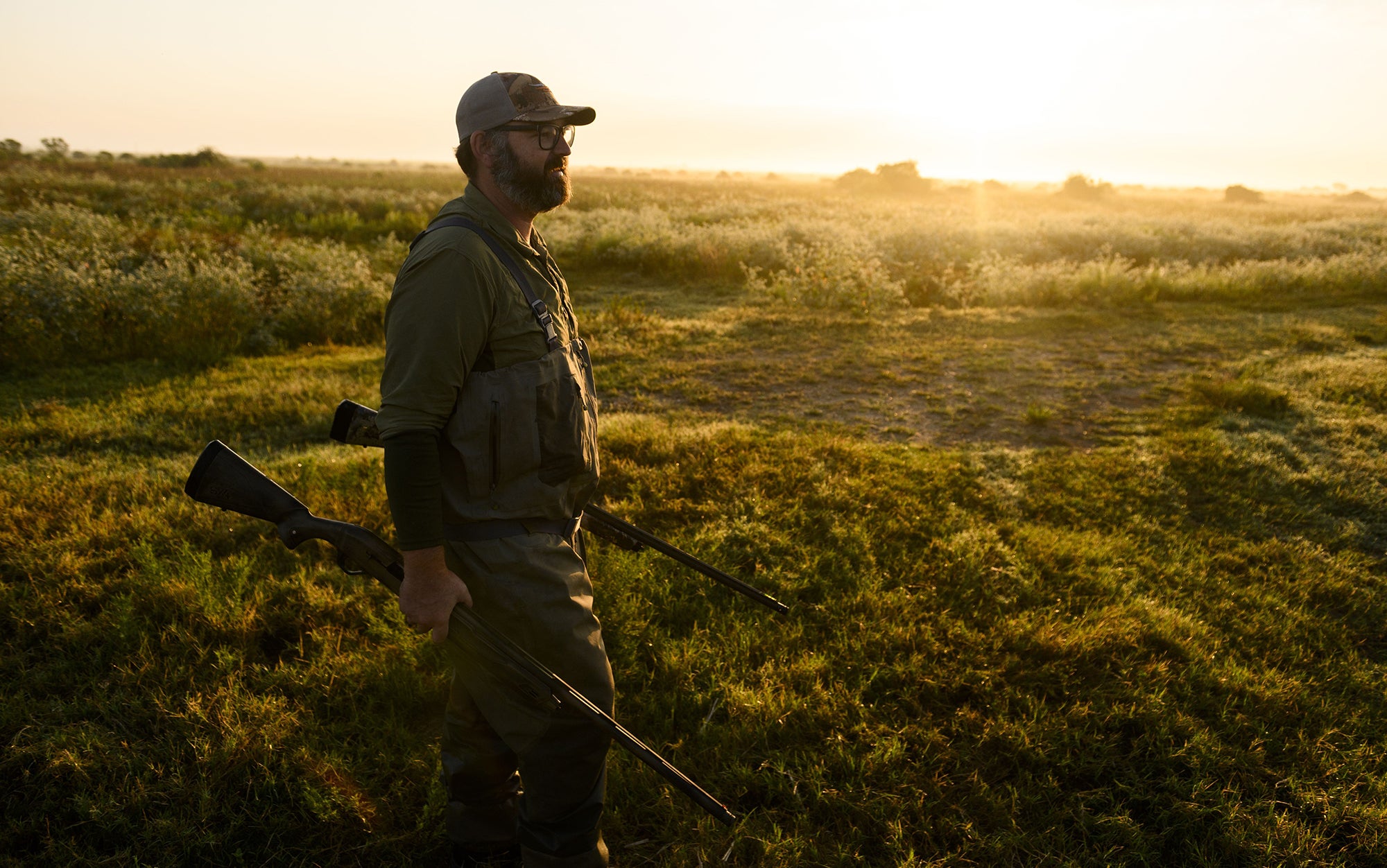
Gas vs. Inertia
Almost all auto-loaders are currently built using one of two different platforms: gas or inertia. Gas-operated semi autos use a specific amount of gas (any remaining gas is bled off, typically through ports in the barrel) generated by the shotshell propellant to operate a piston housed inside the fore-end. The piston drives the bolt backward in order to eject the spent hull. The carrier then picks up a fresh shotshell from the magazine tube and lifts it into the chamber as the return spring sends the bolt forward, placing the shotshell into battery.
Inertia-driven guns use recoil to operate the bolt. The explosion of the shell creates recoil, forcing the buttstock of the shotgun into your shoulder. Inertia guns use that backstop (your shoulder) to briefly lockup the bolt with a tight spring, and then send it backward so the spent shell can be ejected. An inertia spring returns the bolt forward and a new shell is collected.
With any shotgun operating system there are trade-offs. Gas guns typically generate less felt recoil, but can also get dirtier because they use gas to function, which can cause carbon buildup on the piston and action. You must be diligent about cleaning a gas gun. They are usually heavier than inertia-driven guns because there are more components to gas guns. Inertia autos run cleaner than gas-operated shotguns, but you must ensure that an inertia gun is properly mounted so that the buttstock can drive against your shoulder in order to use the recoil and operate the action properly.
Gauge
The 12-gauge is the most popular and versatile. Sub-gauges—16, 20, 28, and .410-bore—are limited, especially the .410. But shotshell technology has made them all more viable for an array of game. There is also the 10-gauge, which has waned in popularity over the last decade.
If you hunt ducks, turkey, deer, pheasants, small game, and shoot skeet, a 12-gauge makes a lot of sense because of its versatility. If you’re strictly a quail and dove hunter, any of the sub-gauges can work just fine, though you have to be very accurate and limit shot distances with a .410 because the pattern density is much smaller than any of the others. A 10-gauge is still a fine option for someone who hunts big Canada geese.
Gun Fit
Finding a shotgun that fits you properly is key. We are all different shapes and sizes. So each gun will fit each shooter a little differently. Be sure to check out long-time writer Bruce Buck’s article on shotgun fit before you buy. And, left-handed shooters should read our review of the best shotguns for lefties.
READ NEXT: 10 Classic Shotguns Every Wingshooter Should Own
FAQs
Q: How much does a semi auto shotgun cost?
The price of new semi auto shotguns on this list range from $700 to more than $2,000. You might be surprised to learn that a used $500 to $700 auto-loader can be as reliable as more expensive options (and last just as long). This is particularly true of autos from the 1970s, 80s, and 90s. The Remington 1100, Benelli Super Black Eagle I and M1 Super 90, Beretta’s 300 series, and of course the Auto-5 are just a few of the classics that are still kicking today.
Q: What is the best semi auto shotgun for waterfowl?
Benelli’s Super Black Eagle 3 is hard to beat for it’s light weight, wonderful handling and proven reliability. However the Beretta A400 Xtreme Plus is also an excellent option for those who prefer a gas gun.
Q: Should I buy a new or used semi auto shotgun?
Most folks think that new means better, but that’s not always the case with shotguns. The semi automatic shotgun hasn’t evolved too much over the decades. You certainly can get more for your money if you buy the right used shotgun.
Final Thoughts
Finding the best semi auto shotgun for you can be a daunting task, particularly when you’re buying a gun you have never shot. If possible, you should shoot a variety of shotguns that belong to friends and attend range days, which manufacturers and retail stores will sometimes hold at local gun ranges. This will allow you to get a feel for different guns and see which ones you shoot well before buying. Don’t dive into this process hastily. A shotgun is a major investment and the right one will last you a lifetime.
- Best Overall: Beretta A400 Xtreme Plus
- Best Value: CZ 712 G3
- Best for Waterfowl: Benelli Super Black Eagle 3
- Best for Turkey: Mossberg 940 Pro Turkey
- Best for Deer: Winchester SX4 Cantilever Buck
- Best for Home Defense: Benelli M4 Tactical
- Best for Small Game: Weatherby SA-08 Deluxe
- Best Sub-Gauge: Beretta A400 Xplor Action 20-Gauge
- Best for Clays: Remington 1100
- Best Youth: Franchi 48 AL
- TriStar Viper G2 Wood Walnut
- Browning A5 Sweet Sixteen Upland
The post The Best Semi Auto Shotguns of 2023 appeared first on Outdoor Life.
Articles may contain affiliate links which enable us to share in the revenue of any purchases made.
Source: https://www.outdoorlife.com/gear/best-semi-auto-shotguns/

